






E x p l o r i n g t h e i s s u e s t h a t s h a p e t o d a y ’ s b u s i n e s s w o r l d g w w w i c p a s o r g / i n s i g h t S U M M E R 2 0 1 6 THE MAGAZINE OF THE Conflict in the C-Suite n 21st Centur y Heists n Jet Set Business n The Hush on Trade Secrets S TEM Talent in Illinois n Managing t he Managers n Big Data n Cyber Def ense...& more! G, BAD AMERICAN MERGERS 5 BE SEEN HERE : 2016 Midwest Accounting & Finance Showcase / 8.23 & 8.24 / Rosemont, IL
Get the Whole Picture with Checkpoint



Thomson Reuters Checkpoint Catalyst® delivers trusted tax research answers framed in an entirely new way, so you can see the clarity, color and context you need to get the whole picture of each business tax issue.





Checkpoint Catalyst is a truly integrated research experience that streamlines the tax research process, eliminating extra steps and guiding you from question to answer to action. Federal, state and U.S. international tax implications are part of the main topic discussion, so there’s no need to look anywhere else. Multiple perspectives from leading industry experts and embedded tools and diagrams provide clear answers and the confidence that comes from knowing you haven’t missed a thing.
To learn more or for a FREE trial, visit checkpointcatalyst.com
©2016 Thomson Reuters
I
tax research process?
How can
eliminate unnecessary steps in my
Catalyst


2 INSIGHT www icpas org/insight i n d e x @IllinoisCPA #INSIGHTmag on the cover 28 5 Epic M&A Fails 32 The 21st Century Heist While technology enables businesses to innovate faster than ever, it also invites evermore ambitious criminals to steal on an ever greater scale 36 Chasing the Global Dream Planning and a healthy dose of foresight help globally minded companies overcome the many complexities and challenges of expanding business abroad. 6 Seen Heard Ice - Cream Socials / Green Tech & Profit / Flextime That Works / Q&A with Jay Levine 12 Tech Pulse Banks & Biometrics / Audit Automation / Meditating Apps / Tax Foundation Goes Digital 16 Young Pros Managing Up The definitive guide to winning over your bosses 18 Leadership The C(onflict)-Suite The CFO’s guide to navigating difficult CEO relationships 20 Workforce Outrageous Expenses Helicopter ride you say? Some expense attempts border on hilarity, but they ’ re also what ’ s wrong with the world of expense reporting 22 Legalities Costly Secrets Are preliminary business negotiations putting your trade secrets at risk? 24 Investing Crowdfunding & the Future It ’ s the darling of the investment world But who’s using it? And how do you get in on the act? 26 Economy STEM Sells Illinois’ competitive edge hinges on preparing its workforce for continued innovation in science, technology, engineering and math 4 Today’s CPA The CPA Pipeline Todd Shapiro 14 Hype It Define Your Own Success and Happiness Sarah Herrmann 40 Tax Decoded Ball of Confusion Keith Staats, JD 42 Inside Fraud Cyber Defense Systems Are Go Theresa Mack, CPA, CFF, CAMS, PI 44 Corporate Minds A Dash of Big Data Rose Cammarata, CPA, CGMA 48 Capitol Report Crisis & Deadlock Marty Green, Esq columnists trending topics features S U M M E R 2 0 1 6 | w w w . i c p a s . o r g / i n s i g h t
gambled and lost in the high-stakes mergers & acquisitions game.
They
 INSIGHTS & SOCIETY NEWS FROM TODD SHAPIRO, ICPAS PRESIDENT & CEO today
INSIGHTS & SOCIETY NEWS FROM TODD SHAPIRO, ICPAS PRESIDENT & CEO today

’sCPA
{Follow Todd on Twitter @Todd ICPAS}
{Watch Todd’s CEO Video Series on YouTube}
The CPA Pipeline
are you part of the problem or the sol ution?
We have an economy that is growing. In study after study, the accounting profession is viewed as one of the top professions to work in There are more accounting majors today than ever before over 250,000 So what’s the problem? And why does
“pipeline” continually come up as one of the top issues facing the profession?
We have to look at the environment a bit more closely to get at the answers. Yes, there are more accounting majors than ever before, but 49 percent of those accounting majors will never sit for the CPA Exam, and one-third of those who do sit for the exam will never complete it As a result, only one-third of accounting majors ever pass the exam With such a coveted credential, why do so few complete the process?
There are many factors driving down the number of new CPAs We can blame a vibrant economy where many companies willingly hire accounting graduates without requiring a CPA We can blame the growth in advisory services at firms that don’t require a CPA. We can blame the 150-hour rule. We can blame the exam format. But in the end, we have to look inward and challenge ourselves on how much we are supporting, pushing and requiring accounting majors to become CPAs.
In an AICPA survey, staff identified work environment as the number one factor influencing whether they follow through and become CPAs a work environment that encourages and supports them in attaining the credential Reasons respondents gave for not finishing the exam included conflicts with work, cost of the exam, the need for time to study, and multiple tries to complete all parts Only 27 percent of test-takers finish all four parts on the first try On average, passing candidates require about 6 5 attempts to pass the four parts The cost to complete four parts and a review class can reach almost $5K
This is where we become either part of the problem or part of the solution. We have to ask ourselves, “Are we creating and fostering an environment that encourages staff to complete the CPA Exam?” Many companies are happy to hire accounting majors and not require a CPA Is that best for your company’s and your staff ’s long-term prospects?
Public accounting firms, too, have to look inwards. In a recent Illinois CPA Society survey of the top 25 public accounting firms in the Chicagoland area, 98 percent said they’re struggling to meet CPA needs or would like a larger pool of CPAs to recruit from Yet 12 percent said they only provide financial assistance for a review course (not the exam) and 12 percent said they provide no financial assistance at all. Of those that do provide financial assistance, only two firms will pay for more than one attempt of a section Yet, the average candidate requires 6 5 attempts to pass all four parts Lastly, 20 percent said they don’t provide PTO or flexible work schedules for the review course or the exam
So, at the end of the day, are we putting our money (literally not proverbially) where our mouths are? If we’re serious about the need for more accounting majors to become CPAs, we need to provide the financial and environmental support to complete the process Yes, it will require an investment of time and money However, with three-out-of-four current CPAs projected to retire in the next 15 years, the pipeline issue is bound to only get worse. In the end, this is time and money we can’t afford not to invest.
The pipeline also hinges on the issue of diversity or lack thereof I’ll talk more about that in my next column
4 INSIGHT www icpas org/insight
INSIGHT MAGAZINE
Publisher/President & CEO Todd Shapiro
Editor-in- Chief Judy Giannetto
Art Direction & Design Judy Giannetto
Production Design Rosa Garcia
Managing Editor Derrick Lilly
Photography Jay Rubinic, Derrick Lilly, Nancy Cammarata
Circulation Carl Siska
National Sales & Advertising
Michael W Walker
The RW Walker Company P: 213 896 9210
E : mike@rwwcompany com
Editorial Offices
550 W Jackson Boulevard, Suite 900, Chicago, IL 60661
ICPAS OFFICERS
Chairperson, Scott D Stef fens, CPA Grant Thornton LLP
Vice Chairperson, Lisa A Har tkopf, CPA Ernst & Young LLP
Secretary, Rosaria Cammarata, CPA , CGMA Mattersight Corporation
Treasurer, Margaret M Hunn, CPA , CFE, CFF Rozovics Group LLP
Immediate Past Chairperson, Edward J. Hannon, CPA , JD, LLM Quarles & Brady LLP
ICPAS BOARD OF DIRECTORS
Brent A Baccus, CPA Washington Pittman & McKeever LLC
Christopher F Beaulieu, CPA, MST CliftonLarsonAllen LLP
Terry A Bishop, CPA Sikich LLP
Jon S. Davis, CPA University of Illinois at Urbana
Eileen M Felson, CPA, CFF PricewaterhouseCoopers LLP

Stephen R Ferrara, CPA BDO USA LLP
Jonathan W Hauser, CPA KPMG LLP
Anne M Kohler, MBA, CPA, CGMA The Mpower Group
Thomas B Murtagh, CPA, JD BKD LLP
Elizabeth S Pittelkow, CPA, CITP, CGMA ArrowStream Inc
Maria de J Prado, CPA Prado & Renteria CPAs
Kelly Richmond Pope, Ph D , CPA DePaul University
Andrea K Urban, CPA ThoughtWorks Inc
Kevin V Wydra, CPA Crowe Horwath LLP
INSIGHT is the official magazine of the Illinois CPA Society, 550 W Jackson, Suite 900, Chicago, IL 60661, USA Its purpose is to serve as the primary news and information vehicle for some 24,000 CPA members and professional affiliates Statements or articles of opinion appearing in INSIGHT are not necessarily the views of the Illinois CPA Society The materials and information contained within INSIGHT are offered as information only and not as practice, financial, accounting, legal or other professional advice Readers are strongly encouraged to consult with an appropriate professional advisor before acting on the information contained in this publication It is INSIGHT’s policy not to knowingly accept advertising that discriminates on the basis of race, religion, sex, age or origin The Illinois CPA Society reserves the right to reject paid advertising that does not meet INSIGHT’s qualifications or that may detract from its professional and ethical standards The Illinois CPA Society does not necessarily endorse the non-Society resources, services or products that may appear or be referenced within INSIGHT, and makes no representation or warranties about the products or services they may provide or their accuracy or claims The Illinois CPA Society does not guarantee delivery dates for INSIGHT The Society disclaims all warranties, express or implied, and assumes no responsibility whatsoever for damages incurred as a result of delays in delivering INSIGHT INSIGHT (ISSN-1053-8542) is published four times a year, in Spring, Fall, Fall, Winter, by the Illinois CPA Society, 550 W Jackson, Suite 900, Chicago, IL 60661, USA , 312 993 0407 or 800 993 0407, fax: 312 993 7713
of the contents may be reproduced by any means without the written consent of INSIGHT
Specialist, at the address above Periodicals postage paid at Chicago, IL and at additional mailing offices
to: INSIGHT, Illinois CPA Society, 550 W Jackson, Suite 900, Chicago, IL 60661, USA

A Good Day for Doing Good #CPAvolunteer

Copyright © 2016 No part
to:
POSTMASTER: Send address changes
Permission requests may be sent
Publications
www icpas org/insight | SUMMER 2016 5 Day of Ser vice
SEEN HEARD
$119,570
income needed to live comfortably in san francisco compared to $68,782 in chicago [GoBankingRates]
HOW TO
THROW AN ICE-CREAM SOCIAL
It doesn’t have to be a mess It doesn’t have to be complicated But a sweet summer treat does have to be fun
Here’s how to throw an adult ice-cream party every employee will love, courtesy of Sam Mason, owner of Oddfellows Ice Cream Co , and The Wall Street Journal
1 Offer four varieties of ice-cream vanilla as the staple, a chocolate option, a wild card, and at least one nondairy option, like a sorbet

2 Use cardboard cups to make clean-up easy
3 Shoot for a buffet so guests can create their custom sundaes on the fly
4 Keep the ice-cream cold using dry ice or salted ice on the table
5 Don’t skimp on the toppings rainbow sprinkles and chocolate pearls, granola, hot fudge and chocolate sauce, caramels, fresh fruit, etc Also try some adult toppings, like brandied cherries or whiskey whipped cream.
6 Set out a blender and maybe even some spirits if this is an all-out, happy-hour style social
MAKE FLEXIBILITY WORK
Work/life balance and schedule flexibility are hot topics in today ’ s accounting world Some employers offer it, some waffle on it, and others just don’t have a clue Offering flexibility doesn’t have to be complicated, however Isaac O’Bannon, managing editor of CPA Practice Advisor, offers up these three simple rules to make a flexible work schedule work for all:

RULE #1: Get the job done
RULE #2: Be damn good at your job, consistently
RULE #3: Be responsive to your boss, your clients and anyone else you do business with or for, so that it ’ s just like you ’ ve been in the office all day
6 INSIGHT www icpas org/insight
N E W S B Y T E S , S O U N D A D V I C E A N D P R A C T I C A L B U S I N E S S T I P S
"Sometimes, the best part of my job is that my chair swivels." anonymous
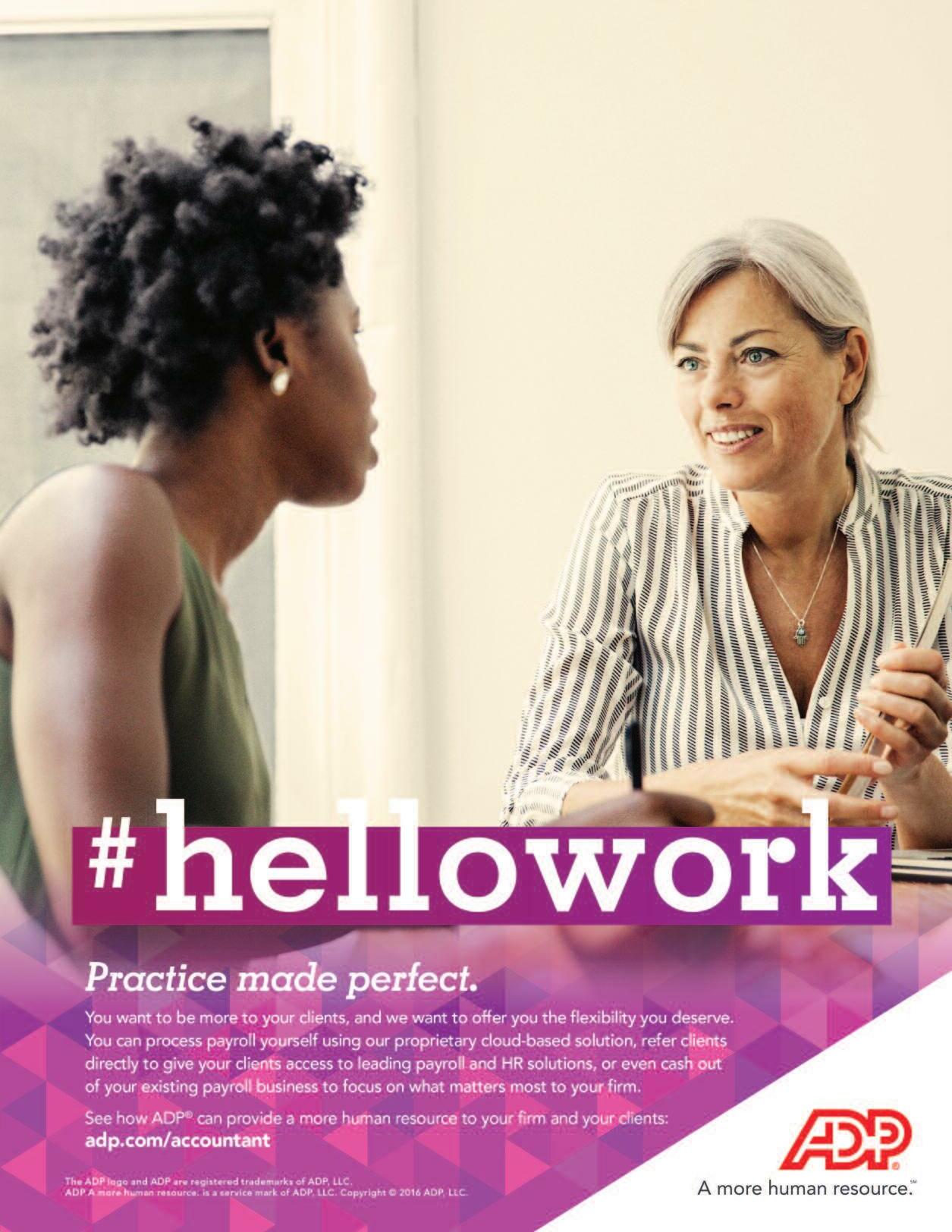
79
billionaires who live in new york city, more than any other city in the world.
[forbes]
Green Tech Grows Your Greenbacks
Reducing your carbon footprint might not be your top priority, but it can actually save money for you and your business and improve your workplace culture CNBC offers these four ways to make it happen.

1 See better: The Department of Energy says widespread LED use could save the U S more than $30B by 2027
2 Stay home: According to Global Workplace Analytics, the average real estate savings for a full-time teleworker is roughly $10K per employee per year.

3 Conser ve more: Water- and energy-efficient appliances can save about $300 annually for a small office Even fixing a leaky faucet or toilet can save up to 90 gallons of water a month
4. Go paper less: Businesses like Lockheed Martin and General Electric are saving $250K to $10B by digitizing paper manuals and processes
This Career Center ’ s For You!
On the hunt for a new gig? Looking to land top talent? ICPAS has launched an all new Career Center that offers job seekers and employers more resources than ever New job search features include the ability to create a free professional profile and portfolio highlighting your top-notch talents, automatic email notifications of new jobs that match your career criteria, and the option to save jobs listings to apply for or revisit later For employers, the service offers unrestricted access to the ICPAS job board, meaning job listings are seen by not only ICPAS members, but also anyone who visits the site We’ve also simplified the prospecting process by launching a resume search tool that notifies you when a candidate has your most needed skills What ’ s more, our new job listing management platform makes it easy to create job posts, check their status and add upgraded features to attract more views
Visit the Career Center today at www icpas org/careers for more info
8 INSIGHT www icpas org/insight SEEN HEARD
6 WAYS TO MAKE LINKEDIN WORK FOR YOU
Just because you create a LinkedIn profile doesn’t mean you’ll automatically attract hundreds or thousands of connections and clients right away. But with a little work, and these 6 tips from Brilliant, you’ll be on the right track.
1. Add a picture
Profiles with a photo receive 14 times more views, so be sure to use a professional photo (no selfies or family snapshots) Headshots, i e shoulders and up, with a simple background are best And don’t forget to smile
2 Customize your URL



LinkedIn allows you to make your own URL when editing your profile Don’t overlook this feature A customized URL with your first and last name makes it easy to use on your business cards, in email signatures, on your resume, in search engines, and more

3 Be searchable
First, include strong keywords in your title, summary and job experience sections Next, complete your skills section (you can list up to 50) Last, make sure your job listings link to the business’ page to increase your visibility with current and past employees
4. Join groups
There’s a LinkedIn group for nearly everything. Find the groups that most closely align with your professional goals and join them. Then connect with group members, share articles and comment on posts to increase your visibility
5. Connect with others
This is what LinkedIn is all about Adding connections increases the likelihood that your profile will be seen by individuals looking to connect with you or hire you
6. Stay active
Write or share relevant articles, make new connections, share job opportunities with your network, and comment on posts and discussions
Whether
www icpas org/insight | SUMMER 2016 9
RENEW TODAY!
you work in public accounting, corporate finance, not-for-profit, consulting, government or education, the Illinois CPA Society provides you with access to an extraordinary community of 24,000 accounting and finance professionals.
www.icpas.org
WHAT’S HAPPENING : 2016 Midwest Accounting & Finance Showcase
KEYNOTE: Jay Levine
q&a
With a career spanning 42 years with the likes of CBS and ABC, this award-winning journalist, reporter and chief correspondent is bringing something new to this year ’ s Midwest Accounting & Finance Showcase keynote For the full interview, visit INSIGHT online at www icpas.org/INSIGHT
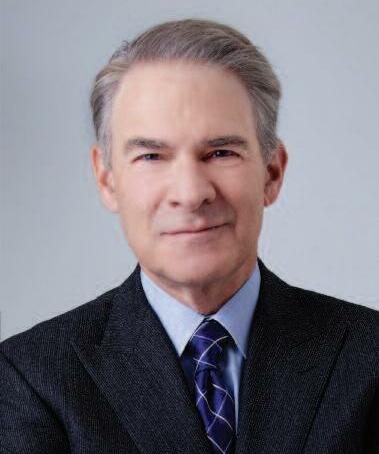
q:You’ve covered so many complex topics. How were you able to shift gears with such varied audiences, which CPAs also often have to do?
a:I’ve covered a lot of fascinating people and events in my career, and what you have to concentrate on is the story. If you can convey interest and enthusiasm and involvement in the story, people will listen But you have to show how and why you’re interested and why the story is important I always reflect back on Mrs Peterson, my daughter ’s fourth grade teacher here in Chicago, who said that you have to start every story you write with a ‘wow sentence’ a sentence that makes people sit up and pay attention I take that message to heart every time I write a story: What’s my wow sentence? What’s my hook? What will get people interested? That’s what people in the field need to think about
q:Were any of those fascinating people and events career changers?
a:Back in the 80s I started traveling all around the world to cover stories going to the Vatican to cover the Pope, going to Central America to chase drug runners, going to Asia to see what they were doing for the Beijing Olympics I guess I have done so many different things and traveled to so many different places that I don’t think there’s been any one thing, it’s just been an evolution Whether it happened in Berwyn or Berlin, I would go there. This is the long way of getting to a short answer, but becoming familiar with the way people live around the world helped me to appreciate what we have here and shaped my perspective of the world, the people in it, and the stories I was covering
8.23 / 8.24
Catch Jay at the 2016 Midwest Accounting & Finance Showcase, held at the Donald E Stephens Convention Center in Rosemont, Ill Register at www.icpas.org/show.htm.
q:You’ve always been an advocate of spin-free journalism How do we find sources we can trust?
a : You know if you’re watching Fox News you’re getting one side, and if you’re watching MSNBC you’re probably getting another You as a viewer, listener or reader need to make your own judgements on what makes sense to you. You have to have your own ‘BS Meter,’ so to speak, to say, “Hey, come on, that’s spin, that’s not reporting ” You have to look very, very carefully at what everybody says and what their ulterior motives are, because sometimes it’s hard to put the blinders on and judge for merits
q:How has social media fundamentally changed how we do business today?
a:It’s having a huge impact and you have to again be very, very careful All too often people are taking something from a blog, which may just be the opinions of some guy sitting in his underwear in his basement who’s never gotten out onto the streets to cover or understand the story, and all of a sudden it becomes truth and reality. On the other hand, social media is very important, it’s an incredibly effective and valuable tool, it lets us multiply by the thousands our eyes and ears around the world.... Back in the day, I used to have to do man-on-the-street interviews to get an idea about what people were thinking; now you just hop on Twitter and Facebook and you get a good sense of that. We don’t operate in ivory towers, we operate in the real world, and without understanding how people are viewing things, it’s impossible for you to do a good job
10 INSIGHT www icpas org/insight
SEEN HEARD
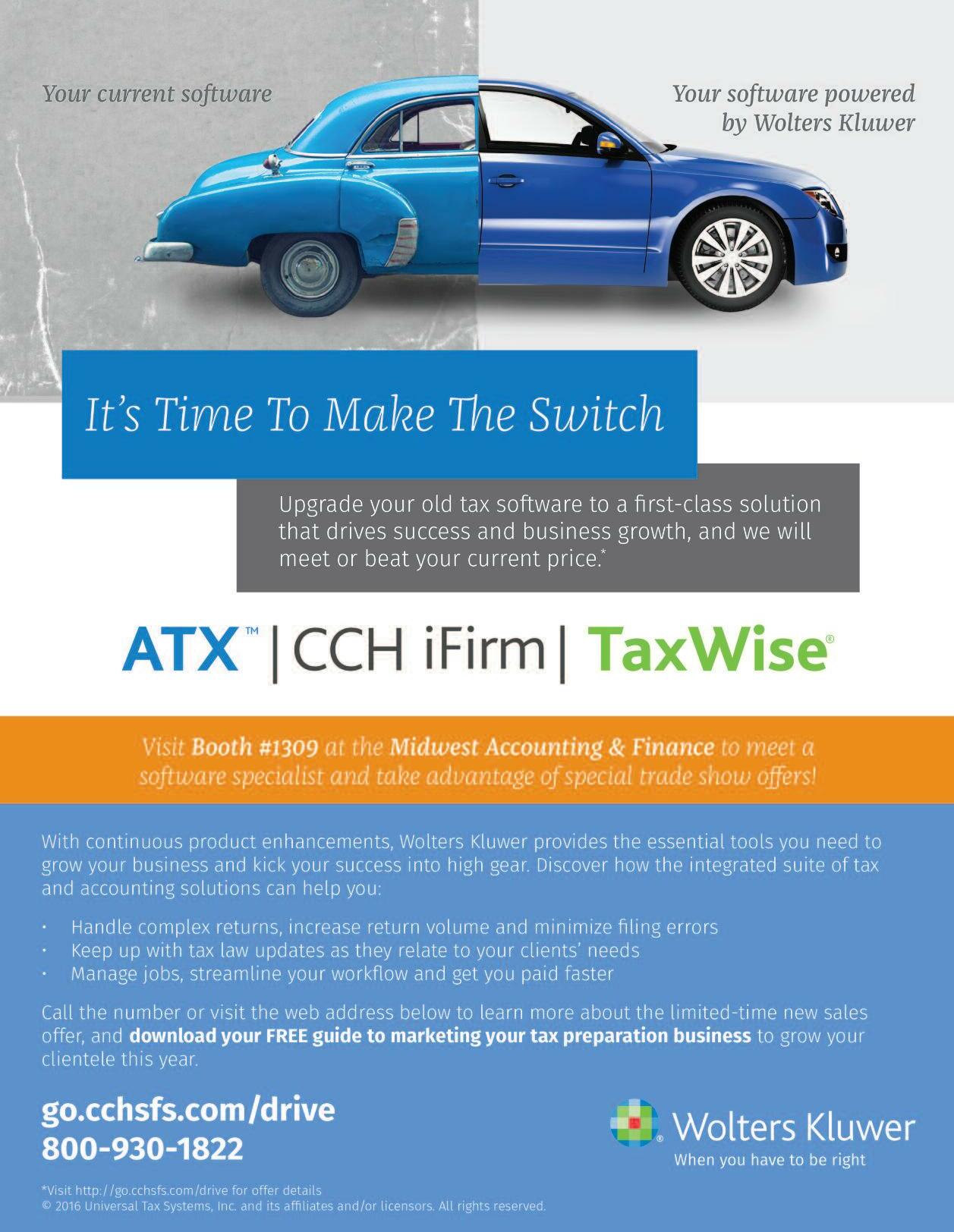
TECH PULSE
revenue per pl ay artists receive every time you stream your favorite song on spotify or itunes [information is beautiful]
Banks & Biometrics

With password security seeming increasingly feeble in the face of hackers and cybercriminals, more and more banks are turning to biometric technologies for security think fingerprints, voice recognition, eye scans and face scans Since cybercrime costs the global economy an estimated $450B a year, according to the Center for Strategic and International Studies, the rush to biometrics in the financial industry is no surprise, and definitely a trend to watch for both finance/accounting professionals and consumers
[Source: Christian Science Monitor]
Tax Foundation Goes Digital
The Tax Foundation [www taxfoundation org] has been printing its Facts & Figures publication since 1941, and now it ’ s bringing it into the digital age with new Apple and Android smartphone apps The app platform will continue the print publication’s mission of delivering accurate data and a broader perspective of the challenges facing public finance today
It includes a variety of features that allow users to view tax rates and brackets for all 50 states, compare tax data with 39 different measures, see when Tax Freedom Day is for each state, compare states’ business tax climates, and much more
Audit Automation Proves Its Worth
Meditate With Omvana

Summer not enough to help you unwind? Try the Omvana Meditation app Available to iOS and Android users, Omvana has more than 500 tracks for meditation, focusing, relaxing, and even sleeping better Have your doubts? It ’ s the number one meditation app in more than 30 countries, and it has a variety of other content to help you find the zen in all aspects of your life Omvana can even help you break a bad habit with hypnosis!
In today ’ s digital age, technology- enabled auditing tools and processes are making waves. When business research firm APQC examined the number of internal control violations per year per 1,000 employees at 70 companies, the top performers experienced 3 51 or fewer violations while the weakest were dealing with 34 23 violations or more annually For a 10,000-employee company in the bottom quartile, that ’ s more than 340 controls violations. So how are the top companies avoiding the same mistakes? APQC found that companies in the top quartile had automated at least half of their primary audit controls compared to only about 12 percent or less for those in the bottom quartile. In other words, more automation means fewer violations. Subsequently, companies and large audit firms are investing heavily in internal audit automation, advanced data analytics and artificial intelligence technologies that can be customized to crawl through enormous volumes of data and learn to identify outliers, recurring patterns and audit risks
12 INSIGHT www icpas org/insight
T H E L AT E S T, G R E AT E S T T E C H N O LO G Y T R E N D S & P R O D U C T S
$0.001
If your clients require expert services, our Client Back Guarantee ensures our consultants are playing for your team. Contact our experts at 866-717-1607. James Schultz Jim Martin Harry Cendrowski CPA/CVA CFF MAFF CMA CIA CFE CPA/ABV CGMA CFF CFE CVA CFD MAFF Working with consultants? Make sure your clients stay with Your Firm. The Business of LINKING OPERATIONAL INTEGRITY For more than 30 years CHICAGO / BLOOMFIELD HILLS / 866-717-1607 / www.cca-advisors.com
CAREERS CONNECTIONS CREDIBILITY
Define Your Own Success ... and Happiness

June’s Young Professionals Leadership Conference, “The Art of Success,” kicked off a year of dynamic and engaging young professional programming Attendees mingled in the modern, industrial space of VenueOne in Chicago’s West Loop, while sharing their thoughts on personal goals, career success and happiness Speakers enthusiastically shared personal anecdotes and answered attendee questions, which made for our most interactive conference yet
For those of you who were unable to experience the fun in person, here are my five biggest takeaways:

1 . Fi n d i n g s u c c e s s i s a p e r s o n a l j o u r n e y. And it’s defined differently by each of us
2. Attitude is key in finding your own success and happiness
3. Make time for the things that make you happy. And try to work that happiness into your day job

4. Think of a jungle gym, not a ladder as you navigate your career trajectory
5. Ask yourself these three questions, courtesy of keynote speaker and bestselling author Jeff Goins: “What do I love?” “What am I good at?” and “What do people need?”
These key points really resonated with me, and I’m eager to put them to practice I hope all of you who attended left feeling energized and excited about forging ahead in your brilliant careers
don’t miss these events! n July 28 - Raise Your Glass! Fundraiser n August 18 - CPA and Attorney Speed Learning n September 23 - CPA Day of Service n October 20 - New Member Happy Hour n November 17 - Improve it! Taking Initiatives Improv Workshop Visit www icpas org/yp htm for details


M U S T- R E A D N E W S F O R U P- A N D - C O M I N G A C C O U N T I N G P R O S S a r a h H e r r m a n n H y p e I t E d i t o r I C P A S M e m b e r O u t r e a c h } YOUNG PROFESSIONALS CENTER WWW ICPAS ORG/YP HTM @ILLINOISCPA
HYPE IT
14 INSIGHT www icpas org/insight
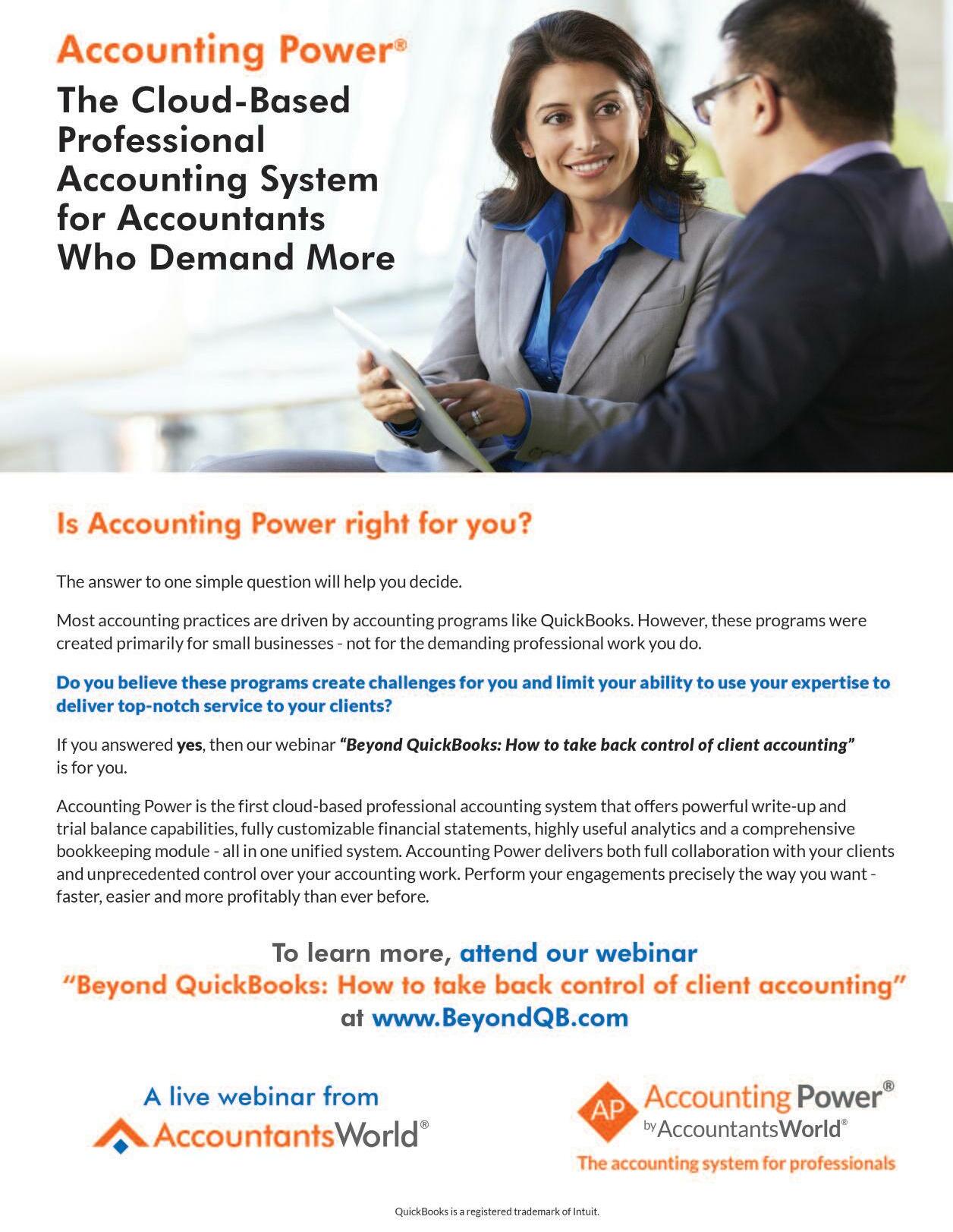
Managing Up
The definitive guide to winning over your bosses

 By Selena Chavis
By Selena Chavis
You may knock it out of the park as an accountant, but do you have what it takes to score on the executive team?
Thinking all it takes is getting the job done is a rookie mistake Relat i
executive coach “Often, people think if they do their jobs well, word will spread, and everyone will know. People don’t realize the importance of relationships and visibility, the importance of evangelizing what you’re doing in a diplomatic way ”
It comes down to thinking about the system rather than a job description, and understanding what really matters to your team’s leaders In essence, it’s about managing up, and it’s an “enormous part of anyone’s job,” Sloane emphasizes
The problem is that so many overlook this simple fact in their hurry to race up the corporate ladder “Young people in particular get frustrated that it’s not moving faster, that their job isn’t as glamorous as they want it to be,” says Bernie Layton, managing director of Stanton Chase’s Chicago operation “Professional development doesn’t happen overnight Be patient and learn how to become valuable ”
With that in mind, here’s how to get a jump on making your way to MVP
1. Be crisp. Be clear
Time is money When engaging C-Suite executives, “Don’t languish or linger,” Layton says “Make sure you’re prepared for the discussion Ask yourself, ‘Where do I expect this conversation to go?’ Then have an appropriate response and recommendation ready.”
2. Bring value
Moving up in the roster requires a clear value proposition “It’s our experience that the board of directors and CEO admire and respect those who offer critical thinking and advisory skills to a company, as opposed to just functionally solving the problems of day-to-day activities,” Layton explains, adding that the most effective professionals he sees driving a board room are those who are “nimble and able to pivot around the direction of the conversation.
“‘Here are the challenges; here are the risks; and here are the numbers a s s o c i a t e d w i t h b o t h ’ I t ’s v a l u e a r o u n d c r i t i c a l t h i n k i n g ; i t ’s v a l u e around being timely; it’s value around knowing the numbers,” he adds
3 Respect ranks
“If you’re ticking off your boss because you’re trying to have lunch with senior executives, it’s not going to work out really well for you,” Sloane warns In fact, you’re falling into a dangerous trap “Your relationship with your boss is going to have a big impact on anything you do and
16 INSIGHT www icpas org/insight YOUNG PROS
i p b u i l d i n g i s k e y, s a y s J a c k i e S l o a n e , M C C , a C h i c a g o - b a s e d
o n s h
your long-term success,” she explains. “A good boss has enormous impact on your career So, you need to know what really matters to them and what really matters to your boss’ boss ”
4. Play fair
N o t o n l y s h o u l d p r o f e s s i o n a l s b e c a r e f u l n o t t o l e a p f r o g t h e i r supervisors in an effort to reach the top, but they should also make a concerted effort to make that supervisor look good “You always want to make sure your boss is winning even as you’re cultivating these relationships with higher-level leaders,” Sloane explains “If you have an idea or information that could be useful, for example, most people you’re reporting to would want to be aware of it ”
5. Speak up
Being right is a valuable commodity, but Layton suggests that, right or wrong, just having a strong point of view can turn heads with senior executives The important value-add is being able to back up what you say. “Take a risk; have a point of view and support it with important information,” he says
6. Think globally
It’s easy to get caught up in your work, but failing to understand the big picture in terms of where the organization is heading is all wrong, Sloane cautions For instance, if your firm is looking to expand in Asia and you find helpful information for that initiative, here’s your golden opportunity to move the information up the food chain
It’s also important to consider how you conduct yourself outside of work Layton notes that social media, while an effective platform for a number of professional endeavors, is also full of trip wires “If you don’t think risk management in terms of social activities, it can have a negative impact,” he cautions.
7. Communicate often and well
While an introverted, analytical personality may prove advantageous when it comes to successfully navigating the technical role of accounting and finance, it may not carry you to the top spot. “There’s a bit of a glass ceiling that occurs when the nature of a p e r s o n i s t o o a n a l y t i c a l , n o t a d a p t i v e w i t h c o m m u n i c a t i o n a p p r o a c h e s a n d n o t c o l l e g i a l e n o u g h , ” L a y t o n o b s e r v e s “ T h e more technical your role, the more you need to step out of your comfort zone and have a personality that’s endearing to the C-suite and board ”
“There’s so much knowledge and expertise in the accounting field But really, in any industry, it’s the soft skills communication skills and that executive presence that, ironically, are going to trump your expertise,” Sloane explains “Your ability to influence and connect is what becomes critical ”
8. Sell yourself
Being an executive is about having the ability to influence people without really trying that hard to do it “There’s this grace about you, this ability to put people at ease, and there’s this intelligence in the questions you ask You’re not saying a whole bunch of stuff j u s t t o b e h e a r d , ” S l o a n e e x p l a i n s “ A l l o f t h a t b e c o m e s m u c h more important in leadership roles. Your role becomes more about getting people on the same page and creating unity ”
In a sense, you’re selling yourself, and you’re selling your agenda. While many accounting professionals tend to shy away from “selling” as a concept, Sloane asserts that anyone who wants to successfully manage up will need to do their fair share of it “Rather than getting people to do something they don’t want to do,” she says, “think about it as helping other people see what you see ”
Invigorate your career search

www.icpas.org/careers
As a benefit of your ICPAS membership, both job hunters and seekers can take advantage of the new Career Center:
SHARE
your resume with all employers (even confidentially)

RECEIVE
new job openings sent directly to your email
STRENGTHEN
your resume with career resources and coaches
POST jobs online quickly and simply*
CREATE alerts for resumes and manage applications
*fees apply
www icpas org/insight | SUMMER 2016 17
The C(onflict)-Suite
The CFO’s guide to navigating difficult CEO relationships
 By Derrick Lilly
By Derrick Lilly
You’re supposed to be the sidekick, the number two, the right hand man (or woman), in a super duo that’s leading the company charge to incredible innovation and sensational success There’s just one problem: Instead of being Robin to your Batman, Batman is treating you like the Joker (or maybe vice versa). Sure, tiffs and riffs and competitions happen in the C-suite, but when the CFO and CEO are at odds well, let’s just say a super team can quickly turn super sucky
In the rare case when “conflict between the CEO and CFO shows up in a public way, it can cause significant damage to the organization,” warns executive coach Jay Scherer of Scherer Executive Advisors “The solution to touchy relationships, and a Golden Rule for anybody who works for anybody, is to have regular discussions and ask for feedback Unfortunately,” Scherer says, “Some CEOs don’t give very good feedback until the feedback is that today’s your last day.”
So before your super duo falls into super shambles, let’s take a look at some of the most common C-suite conflicts and what savvy CFOs can do to save the day and their jobs
Split strategies: The tone is set at the top, right? So when the CFO and CEO aren’t aligned with each other or the corporate strategy, all hell could break loose “The CFO is a critical enabler of the organizational strategy and most CEOs need the CFO to be 100-percent bought in for a strategy to succeed,” says Scherer. “If the CEO and CFO aren’t united and aligned in their thinking, they can’t expect the rest of the senior team and organizational staff to fully have their backs ” That could translate into low employee morale, wavering investor confidence, and the overall faltering of the business.
“There’s a cultural due diligence that an incoming CFO needs to do when joining a new company, and that also applies when it comes to the CEO,” explains Ajit Kambil, Ph D , global research director for Deloitte’s CFO Program. “A new CFO needs to learn the CEO’s style, what the CEO might be looking for, and what he or she believes in and expects Most CEOs want the CFO to be an effective business partner with them on the change journey that they are trying to execute in their organizations.”
18 INSIGHT www icpas org/insight LEADERSHIP
“Awareness by the CFO of what the CEO wants is key,” Scherer adds “Try to be forward-looking and action-oriented This way, you can try to stay a step or two ahead of the CEO and anticipate what’s needed to be done.”
Mixed Roles: “A lack of clarity around the specific definition and focus of the role of both the CFO and the CEO can be a recipe for disaster,” says Scherer In other words, there should be absolute clarity around what the CFO should be working on, as directed by the CEO, board or private equity owners or all of the above The last thing you want is to be stepping on each other ’s toes, butting heads over tasks, or wondering what the other is doing.
“Be very sure to work on specific definitions of the roles and understand specific expectations of the CEO,” Scherer emphasizes
C o m r a d e s v s C o m p e t i t o r s : CFOs are wearing more and more hats within organizations and taking on more public roles, dealing directly with board members, shareholders, private equity owners and activist investors. As a result, CFOs often emerge as the second highest ranking executives in a company and the logical successors to departing, underperforming or troubled CEOs.
B u t a c t i v e l y t r y i n g t o p u s h o u t t h e CEO rather than simply prepping for the r o l e i s a d i f f e r e n t m a t t e r a l t o g e t h e r “ H o w d e t a i l e d , h o w o f t e n , a n d h o w these communications look can create c o n f l i c t b e t w e e n t h e C E O a n d C F O , ” warns Scherer.
Risk Appetites: Here again, styles and philosophies can be a source of conflict and rivalry. CEOs are typically extroverted visionaries with lofty goals and an appetite for business risk, while CFOs are commonly the analytical ones, poised to offer a reality check “In some ways the role of CFO is to keep the CEO out of trouble,” Scherer says “Where conflict can arise is when the definition of ‘trouble’ is not shared between the two ”
Thankfully, most of these conflicts can be stemmed off with early relationship building at the first sign of disharmony. In most cases, Scherer explains that the CFO will need to be the one to take the initiative The same applies when a tiff, riff, misunderstanding or rivalry occurs.
“This means letting your guard down, opening up a discussion and having some humility Use statements like, ‘I feel like I’m not meeting your needs’; ‘I don’t feel like we are on the same page here’; ‘What am I missing?’ ‘Am I focusing on the right things?’” Scherer suggests
“We’re often afraid to have these conversations, we delay them, we don’t do it, we don’t open up, and before we know it, we’re too far apart,” he adds
Realistically speaking, once the partnership is beaten and battered, there are few choices left to make either you suck it up and get your CEO’s back or you plan your escape “Usually when a CEO takes a ‘my way or the highway attitude’ it’s because they d
Scherer If the misalignment is too great, the CFO should probably begin their search to find a place where they fit and can truly be a partner with the CEO ”
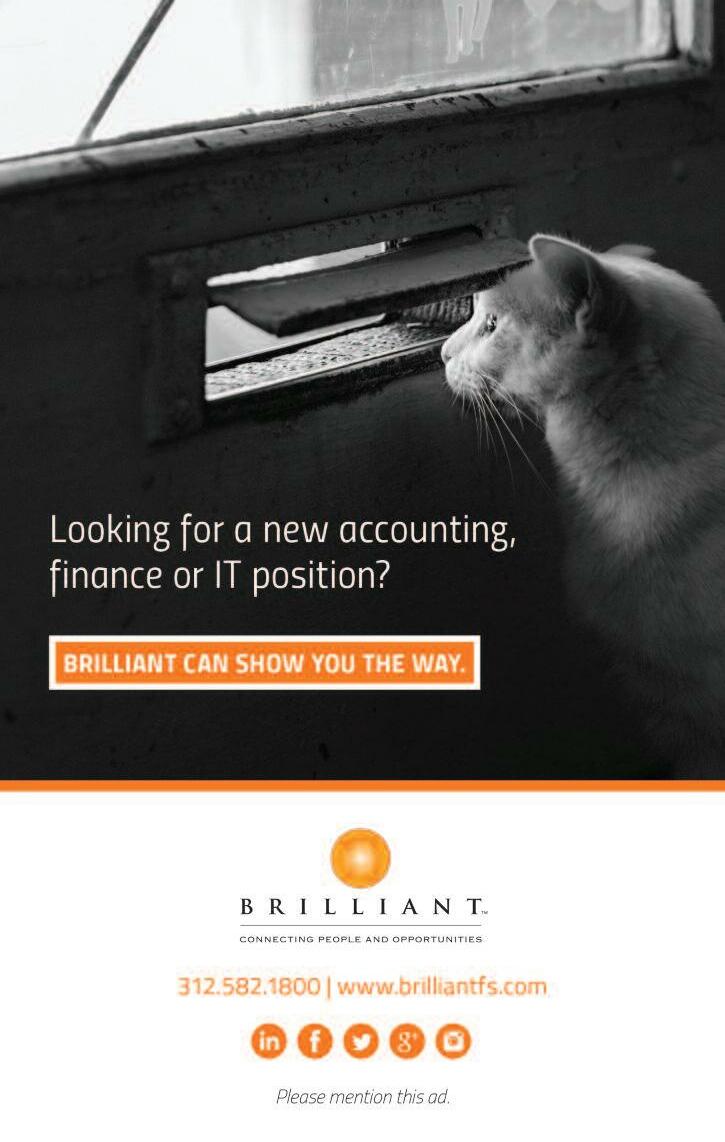
n ’t f e e l t h a t t h e C F O i s o n t h e s a m e p a g e w i t h t h e m , ” s a y s
www icpas org/insight | SUMMER 2016 19
o
Outrageous Expenses
Helicopter ride you say? Some expense attempts border on hilarity, but they ’ re also what ’ s wrong with the world of expense reporting.
By Sheryl Nance-Nash
Who’s Fault Is It Anyway?
Rental homes, beef in bulk, toilet paper, new cars, doggie day spas, vacations, flat-screen TVs, loans, rents, medications, taxidermy, dance classes, a welder, somebody else’s salary Apparently some employees mistake “think outside the box" to mean “get creative with your expense reporting ”
Truth be told, the number of improper expense report requests shows little sign of declining In fact, only 11 percent of executives said they saw a drop in inappropriate requests over the past few years in a recent Robert Half Management Resources survey.
“These outlandish and sometimes funny examples shed light on what can be a serious problem for businesses Inappropriate expense reports are costly both to the company’s bottom line and to the careers of the people who submit them,” says Tim Hird, executive director of Robert Half
We can’t tell you with any certainty how much outrageous expenses have cost companies, however After all, “Who would divulge such a thing; it’s embarrassing,” says Steve Lickus, regional vice president of Robert Half in Chicago.
Others simply squeeze their way through the approval process, like the employee who “submitted an $800 helicopter ride in the South of France It actually got approved as a safer form of travel,” Brian Bleifeld, CPA, recalls

And while business travel typically q u a l i f i e s a s a n o r m a l business expense, there are limitations to even this
“An employee needed to be in New York Monday but he wanted to fly out on Friday, because he said it was the same
It wouldn’t be fair to point the finger only at employees when it comes to issues surrounding expense reporting According to research commissioned by global software company Unit4, 32 percent of US employees are frustrated with their employer ’s expense process, and 42 percent feel financially taken advantage of through the expense reporting claim process
“The reasons for not submitting are varied: It’s time-consuming or frustrating, lost receipts, claim amounts are too low to bother, or some employees simply forget,” says Kara Walsh, chief human capital officer at Unit4.
The trouble here is that this could lead to a negative work environment where employees are short of money and feel disengaged in their jobs “Since people are the core of any company, particularly those in service industries, a disengaged workforce will inhibit long-term strength and stability,” says Walsh
Here, again, technology could be the solution “Make the expense management process easy, on-the-go and intuitive,” suggests Walsh, pointing to the benefits of mobile expense reporting apps. “Functionality like automatic tracking and filing mileage, and creating e-receipts from photos of receipts, frees people from inadequate processes and in turn makes for a happy employee,” she says
20 INSIGHT www icpas org/insight WORKFORCE
cost So when he got back from his business trip, he included his hotel bill, receipts for a Broadway show and tourist attractions He pleaded ignorance,” Lickus tells us.
Jesse Harrison of Zeus Legal Loans has seen some interesting claims as well. “I’ve seen employees claim more hours than exist in the day, which means they not only weren’t sleeping, but they magically added one more hour to the 24-hour clock,” he says. “Another ridiculous attempt I encountered was for a $1 pen. An employee had bought pens from the office supply store with his own money and he wanted to be compensated for the amount of pen used for work versus personal use
“Still another employee wanted to charge the company for an accident that she caused on her way to work, and another wanted to charge her employers for the depreciation of her car due to commuting to work ”
So how can businesses stem the tide of silliness? Here are four straightforward solutions
1. Train employees
“ We m a k e s u r e e v e r y e m p l o y e e u n d e r s t a n d s h i s o r h e r r i g h t s regarding expenses by having regular meetings,” says Harrison “But a good rule of thumb is to put yourself in your boss’ shoes If your boss would find the expense laughable, then don’t try it ”
2. Communicate clearly
Once clear-cut rules are in place, make sure you communicate them regularly “You have to remind employees of policies at least twice a year and it should be a part of the onboarding process,” Lickus explains

3. Go paperless

Another best practice is to eliminate paper processes altogether, says Phil Gorman, founder of ExpenseTech “Use software Rules or policies, such as requiring sufficient details about individual expenses, monthly submission deadlines and approval chains, are what we recommend most often Without structure, some employees may take advantage of the lack of oversight and ask for forgiveness later,” he warns
4. Ask questions
Before any expense is submitted, Robert Half suggests asking these three questions:
n “Is this within the company policy?” If there’s any question, check with the HR department Taking a few minutes at the outset can spare embarrassment later
n “Could there be any confusion?” If your boss doesn’t know the baseball tickets you bought were to entertain a client, you could be putting yourself in hot water unnecessarily.
n “Does this pass the grandma test?” “Would you be comfortable telling your grandma what you’re trying to put through,” asks Lickus. “If not, don’t do it.”
T h e w o r l d o f e x p e n s e r e p o r t i n g , m u c h l i k e t h e w o r l d o f t a x exemptions and excuses for being late to work, will remain filled with grey areas and the likelihood of a laugh or two Whatever you can do to keep things on the up and up will save company time and money, as well as employee morale
www icpas org/insight | SUMMER 2016 21 Dive deep into the topics impacting business, accounting & finance today. Your one-stop resource for today’s hotest topics in CORPOR ATE FINANCE CAREERS PR ACTICE MANAGEMENT LEGISL ATION PLUS: Exclusive Monthly Articles Check it out today! www.icpas.org/copydesk
Costly Secrets
Are preliminary business negotiations putting your trade secrets at risk?
 By Brian J. Hunt, J.D.
By Brian J. Hunt, J.D.
Your team’s been working this deal for months, crunching all the numbers, diving deep into all aspects of the business, and planning every step of the strategic combination You think you’re about to sign on the dotted line, and then the firm you’ve been wooing all this time finds a better suitor
In a business climate that’s teeming with mergers and acquisitions, it’s not uncommon for some of these relationships to sour. But what happens to all of that important and sensitive business information you shared? What happens when that firm moves on without you, but with a wealth of confidential and competitive information about your business? What, then, can you do to protect yourself?
incentive-points program (Destiny was a pioneer of such points-based programs).
As expected, the parties executed a common-sense confidentiality agreement governing the exchange of business information during the negotiations, which prohibited them from using or misapp
agreement didn’t commit Cigna to a business relationship with Destiny, prohibit it from developing its own points-based program, or prevent it from contracting with another vendor
During their negotiations, Destiny provided Cigna with secret actuarial data, marketing data and other trade secrets to enable Cigna to “deep dive” into Destiny’s program Following this, however, Cigna informed Destiny that it couldn’t move forward with the business relationship, citing among other reasons the lack of customization available with Destiny’s program and Destiny’s refusal to consider a relationship other than a joint venture After breaking things off, Cigna moved on with one of Destiny’s competitors to implement a points-based program.
This understandably didn’t sit well with Destiny, which ultimately filed suit against Cigna, alleging misappropriation of trade secrets pursuant to the Illinois Trade Secrets Act, 765 ILCS 1065/1 et seq. (Trade Secrets Act), and breach of the confidentiality agreement.
Ultimately, however, the Circuit Court sided with Cigna, finding that Destiny failed to present any evidence that the organization used confidential information when implementing its program Destiny was dealt a further blow by the Illinois Appellate Court when, on appeal, it affirmed the Circuit Court’s decision, rejecting Destiny’s principal argument that Cigna used trade secrets in the development of its incentive-points program
through improper acquisition, disclosure, or use; and the owner of the trade secret was damaged by the misappropriation
With respect to whether a trade secret existed, the Court noted that Destiny failed to identify the alleged trade secrets or confidential information that Cigna used in the development of its points program with any degree of particularity
22 INSIGHT www icpas org/insight LEGALITIES
Destiny Health Inc v Connecticut General Life Insurance Co , 2 0 1 5 I L A p p ( 1 s t ) 1 4 2 5 3 0 , a d d r e s s e s t h i s v e r y q u e s t i o n H e r e , defendant Cigna Corporation (Cigna) was interested in expanding i t s e m p l o y e e w e l l n e s s p r o g r a m b y c o m b i n i n g i t w i t h D e s t i n y Health Inc ’s
i a t i n g a n y c o n f i d e n t i a l i n f o r m a t i o n N o t a b l y,
w e v e
e
r o p r
h o
r, t h
I n m a k i n g t h i s d e c i s i o n , t h e C o u r t r e v i e w e d t h e t h r e e e l e m e n t s r e q u i r e d t o e s t a b l i s h t h e i m p r o p e r u s e o f t r a d e s e c r e t s , n a m e l y, a t r a d e s e c r e t e x i s t e d ; t h e s e c r e t w a s m i s a p p r o p r i a t e d
The Court then turned to the second element, misappropriation of trade secrets, which can be proved under the Trade Secrets Act in one of three ways: Improper acquisition, unauthorized disclosure, or unauthorized use To satisfy the unauthorized use prong, Destiny would have needed to show that Cigna couldn’t have created its points program without utilizing Destiny’s trade secrets However, Destiny’s own expert witness explicitly stated that he couldn’t point to any evidence that Cigna actually used Destiny’s trade secrets in the development of its program
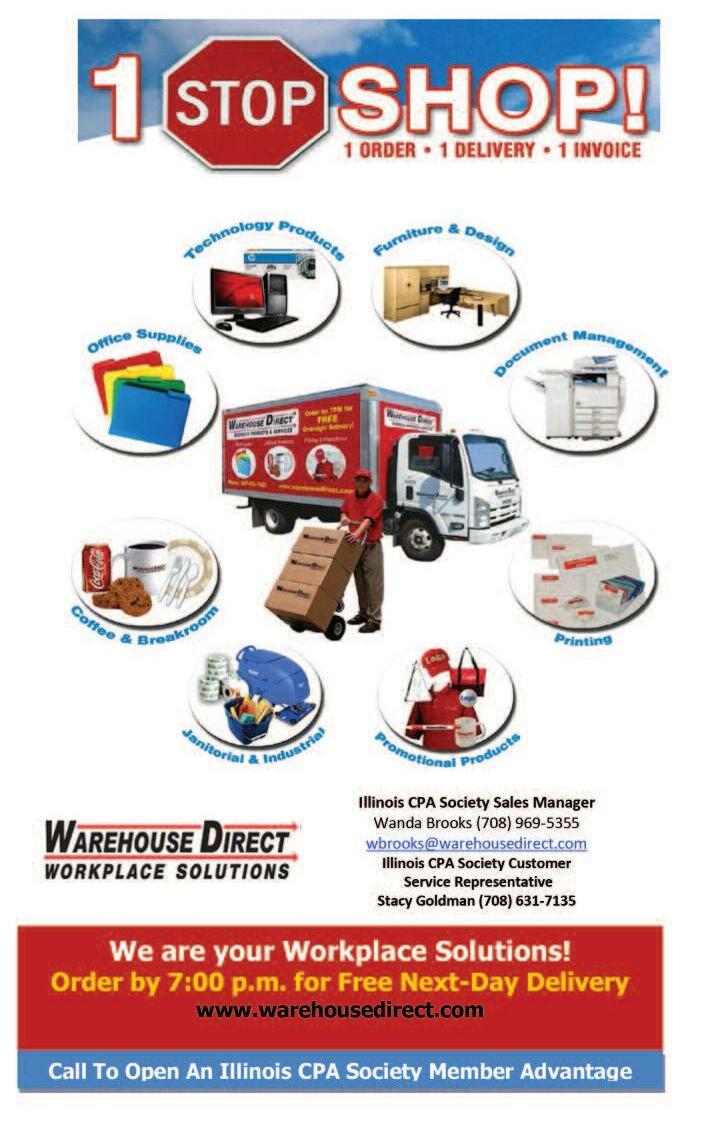
Destiny further argued that the circumstantial evidence it presented required a reversal of summary judgment In essence, Destiny asked the Court to infer that Cigna misappropriated trade secrets because Cigna had access to its information and later developed a program similar to Destiny’s. The Court rejected this argument, noting that circumstantial evidence can be used to support a cause of action, but must demonstrate that the misappropriating party had access to the secret and that the secret and the defendant’s competing product share similar features The Court found that Destiny produced no direct or circumstantial evidence that the two programs were similar, and also noted key conceptual and operational differences between Cigna’s customizable program and Destiny’s fixed program
Destiny’s final, alternative argument asserted that it sufficiently established Cigna’s use of its trade secrets under the “inevitable disclosure doctrine.” Cigna, on the other hand, argued that the inevitable disclosure doctrine shouldn’t apply in the context of failed commercial transactions The Court again agreed with Cigna, noting that misappropriation means more than merely using information gained from an analysis of a possible target company or business partner. Notably, the Court held that the fact that information Destiny provided might have better informed Cigna’s evaluation of whether to partner with Destiny wasn’t enough to determine that Cigna misappropriated Destiny’s trade secrets. The Court reasoned that Destiny would need to show that Cigna could not have developed its program without the use of Destiny’s trade secrets Without that, the Court could not find that the use of trade secrets was inevitable.
F i n a l l y, b r i e f l y t u r n i n g t o D e s t i n y ’s claim arising out of breach of the confidentiality agreement, the Court ruled in favor of Cigna here as well, noting that Destiny set forth the same rejected arguments in support of this claim as those in its trade secrets claim.
The case of Destiny Health shows us how rough a breakup can sometimes be. The lesson here is simple: Be careful about the relat
Brian J Hunt is the managing principal of The Hunt Law Group LLC in Chicago He has been chosen as one of Chicago’s Top Lawyers and as one of Illinois’ Top Rated Lawyers Brian’s practice focuses on business litigation and the defense of corporations and individuals in the areas of construction, premises, transportation, product and professional liability He can be reached at bhunt@hunt-lawgroup com or 312 384 2301
i o n s h i p s y o u f o rg e a n d t h e p a r t n e r s y o u t h i n k a b o u t g e t t i n g involved with
www icpas org/insight | SUMMER 2016 23
Crowdfunding & the Future
It ’ s the darling of the investment world But who’s using it? And how do you get in on the act?
By Robert J Derocher
Want to follow the crowd to entrepreneurial fame and investor fortune? Tread carefully, warns longtime Chicago business adviser and attorney Bill Hubbard of Hubbard Business Counsel. “This is an important area of business growth and investment if it doesn’t get mucked up and it could get mucked up,” says Hubbard, former chair of the Illinois CPA Society Mergers and Acquisitions Special Interest Group “Yet if you really want to grow your business, this is a realistic growth opportunity for you to seriously explore.”
Although crowdfunding has been around in various forms for the last few years, recent law and rules changes in Illinois and nationally are likely to alter the business and investment landscape in the years ahead both for entrepreneurial business owners and eager investors

The evolving crowdfunding environment is also likely to mean more business opportunities for CPAs and finance professionals on both sides of the investment fence, as auditing, verification and solid financial and business plans and operations become critically necessary for entrepreneurs and investors alike
Crowdfunding defined
While the mention of crowdfunding conjures a mélange of fundraising images, from the inspirational (helping Boston Marathon bombing victims recover) to the bizarre (Help Me Buy a 20pc McNugget Meal!), it’s actually big business and a big deal in the corporate world today. A report released last year by crowdfunding research firm Massolution found that global crowdfunding jumped from $6 1B in 2013 to $16 2B in 2014, with another more-than-double increase to $34 4B expected in 2015
Crowdfunding is typically divided into four distinct types: donation-based (donors united behind a cause), reward-based (donors get a gift or reward from a company), lending-based (often called P2P or peer-to-peer business loans) and equity-based (donors receive financial shares in a business). Crowdfunding websites such as Kickstarter, GoFundMe and Indiegogo which focus on donation and reward-based programs have garnered some of the earliest attention and funds
But a combination of changes in federal and state regulation is expected to put a greater focus on and more money into debt- and equity-based crowdfunding On a national level, May 16 marked the initiation of Title III of the Jumpstart Our Business Startups (JOBS) Act of 2012, which opens the doors of business investment to non-accredited investors Depending on income and net worth, they can invest up to $100K in any year in companies that use online FINRA-registered crowdfunding portals or broker-dealers to raise capital under the US crowdfunding regulation.
Dara Albright, an investment and finance professional, and early advocate of crowd-structured financial products, prefers to call this newest wave of investment “crowd financing ”
“It’s really not anything different than the regulated financial industry Instead of money coming from large institutional investors, the capital is coming from ‘We, the People,’” she says “It represents a first step in democratizing access to capital We’re going to see an entirely new path for finance capitalization ”
Title III represents a significant shift for small and small middle-market businesses and startup owners, who previously tended to rely on generous family members, maxed-out credit cards,
24 INSIGHT www icpas org/insight INVESTING
bank loans, and a limited number of ‘accredited’ investors who had to certify their own financial stability and wealth, says Hubbard
“Any path to access investment capital for most entrepreneurs with a solid business and good operations and prospects has been significantly limited throughout my career,” he explains “This change provides such business owners with their first realistic opportunity one which has not, until now, existed in the United States It’s likely, if done right, to be exceptionally useful for a substantial minority of businesses if structured correctly for the business and each prospective investor alike ”

This is also an opportunity for entrepreneurs to devote more time to growing their business operations and financial bases, says L a u r e n L e i b o w i t z , m e m b e r s h i p a d m i n i s t r a t o r f o r t h e N a t i o n a l Crowdfunding Association (NLCFA) “Now they can go out and market their business and convert their customers into investors ”
For businesses treading into the crowdfunding arena, there are four major advantages, according to Anthony Zeoli, the Chicago finance and crowdfunding attorney who wrote Illinois’ state-level crowdfunding law: Good public relations, building brand loyalty, a cheaper source of capital than borrowing, and more independence, since power is not concentrated among fewer shareholders with large stakes
For Regular Joe investors, it’s a chance to use a relatively small amount of money to get ahead of the curve on a growing business or idea “Regular people have never been able to do this It’s always been a country club deal,” says Zeoli “This is exciting Now everyday investors will have the opportunity to invest in the types of ‘private company’ deals that were previously available only for highnet-worth and institutional investors.”
While the SEC has led federal crowdfunding regulations, more than 30 states have developed their own state-level crowdfundingrelated legislation and rules, with Illinois becoming one of the latest entrants on January 1 of this year Illinois HB 3420 permits unaccredited state residents to invest up to $5K per year (with no limits for accredited investors) in Illinois companies via online crowdfunding The bill further allows companies to raise as much as $4M per year via online equity and lending-based crowdfunding
Crowdfunding & the CPA
Whether the potential client is a neophyte investor or a regulatory minded entrepreneur, the crowdfunding rush is opening a growing market for CPAs and finance professionals Mindful of the potential for fraud and overeager over-investors, the SEC and the State of Illi-
nois have each put in multiple safeguards intended to protect investors That translates into opportunities for accounting and financial experts to offer their input
Among the requirements: Financial audits and reviews of financial statements performed by licensed accountants (depending on the amount of capital raised); compliance with Generally Accepted Account Principles (GAAP) if applicable; regular financial disclosures to investors, including an annual report and a business forecast; and third-party financial verification of accredited investors (required under an earlier section of the JOBS Act) In Illinois, companies raising $1M or more must have professionally audited financials, business plans and a determination of the company’s value


They must also provide quarterly or semi-annual financial statements to investors as applicable.
For many potential small businesses, preparing to go the crowdfunding route will require plenty of up-front work and plenty more to follow, says Hubbard “You might have to change your accounting operations, and it’s not going to happen overnight,” he explains
As for investors, while limits are in place to reduce any potentially large losses, they’ll still have to do their homework, Hubbard and others say. And with many first-time investors expected to wade into the crowd, financial literacy and advice are key.
“I would hope that the crowd will go to their trusted CPAs or finance professionals,” says Leibowitz “There’s a lot of consultation and advisement that can be done They can ask them, ‘Do you see this as viable? Do you see this as appropriate for me?’ It really gives investors an opportunity to put professional eyes on things ”
Although anticipation among investors has been building for the launch of Title III and possible further tweaks by the SEC and the states in the years ahead to grow equity-based crowdfunding many observers say it could take some time for it to become an established part of business growth and investment Albright expects that a generational shift will help speed the change, however
“There will be a great transfer of wealth from the Baby Boomers to the Millennials. They don’t trust Wall Street. They don’t trust banks. But they do trust the Internet,” she says. “When it starts to scale up is when you see the industry tapping into the $14T in retail retirement accounts ”
“The faucet has been turned on,” says Leibowitz “Now we’ll see what happens ”
www icpas org/insight | SUMMER 2016 25
STEM Sells
Illinois’ competitive edge hinges on preparing its workforce for continued innovation in science, technology, engineering and math.
By Carolyn Kmet

Boasting a $736B GDP, driven by 30-percent growth over the last decade, the State of Illinois is a key player in our domestic economy, ranking fifth in the nation in terms of gross domestic product With headlines constantly accusing Illinois of being a bad state for business, however, this may come as a bit of a surprise. The reality is that state efforts to nurture and drive advances in innovation and technology are showing significant signs of life
Skokie-based Technology Innovation Center (TIC) is a perfect example. TIC exists to support technology-based companies at the earliest stages of growth think pre-market, pre-money and even pre-employee. In 2014, for instance, TIC launched a laboratory-based incubator to provide entrepreneurs in the hard science industry with access to laboratories in a purely commercial environment. “This fills a critical gap in moving scientific innovation from the large institutions such as universities, hospitals and corporations where it is created, to the marketplace,” explains Tim Lavengood, executive director at TIC and Science Innovation Labs
TIC’s impact on the Illinois economy is nothing short of groundbreaking “We’ve graduated more than 350 companies, including Illinois Superconductor Corporation, Peapod Inc and Leapfrog Online,” Lavengood explains. “After 15 years, almost half of all TIC graduates are still in business. They’ve created more than 2,000 jobs, occupy more than 120,000 square feet of commercial space under rental, and have received more than $45M in private equity investments.”
While TIC is certainly a success story, Illinois’ economic growth remains vulnerable to a widening gap between business needs and workers’ skills in the advanced fields of science, technology, engin e e r i n g a n d m a t h (

advances, increased offshoring, and displacement of work to other states, which has thinned the ranks of manufacturing and high-tech positions What’s more, Illinois’ displaced workers are having difficulty finding new employment because they lack the advanced technical skills demanded by new jobs within these sectors
“The State must create high-paying jobs to bolster the middle class, while also significantly increasing the skill levels of the potential pool of workers so they are qualified to fill these jobs,” the Report states. “No matter how the State decides to overcome these challenges, a strong STEM education program is an inherent part of the solution ”
Indeed, if the State’s STEM initiative Illinois Pathways is right, by 2018 Illinois employers will offer more than 319,000 jobs requiring STEM education and training a nearly 20-percent increase since 2008
“The economy grows when individuals and businesses expand their presence or enter new markets Unfortunately, the skills gap in STEM leaves engineering leaders, executives and HR professionals looking for the needle in a haystack, and without top talent, it’s hard to capitalize on the opportunities these new markets represent,” says Bassanio Peters, CEO of Assist 2 Develop
In essence, the future of the Illinois economy and its ability to capitalize on STEM opportunities hinges on the future of our education system Recognizing this, the State is looking to not only increase the number of STEM-educated individuals entering its workforce, but also change the way it approaches education on a fundamental level For Illinois to remain competitive, school curricula must include an international perspective, learning and thinking skills, information and technology skills, and life skills, all taught starting in kindergarten, says the Illinois STEM Education Report “The 21st Century worker needs to understand multiple disciplines; for example, an engineer needs to understand human factors, marketing, financial planning, and entrepreneurship,” the Report states
Part of the State’s initiative includes the creation of the Illinois P-20 Council, which will foster collaboration between state agencies, educational institutions, community groups, employers and
26 INSIGHT www icpas org/insight ECONOMY
S T E M ) A c c o r d i n g t o N o r t h e r n I l l i n o i s U n i v e r s i t y ’s I l l i n o i s S T E M E d u c a t i o n R e p o r t , t h e S t a t e i s f a c i n g s e v e r a l h e a d w i n d s : I n c r e a s e d p r o d u c t i v i t y d r i v e n b y t e c h n o l o g i c a l
taxpayers in order to develop a sustainable statewide system of quality education and support. The “P” in the Council’s name represents preschool, and the 20 represents grade 20, or education after college The goal: To increase the proportion of Illinoisans with high-quality degrees and credentials from 44 percent to 60 percent by the year 2025
To further support this goal, Illinois Pathways has formed Learning Exchanges around high-demand career clusters and industries, i n c l u d i n g A g r i c u l t u r e , F o o d a n d N a t u r a l R e s o u rc e s ; E n e rg y ; Finance; Health Science; Information Technology; Research and Development; and Transportation, Distribution and Logistics. Each Learning Exchange identifies local and regional business needs, f a c i l i t a t e s p a r t n e r s h i p s a n d e x p e r i e n c e s t o s u p p o r t e d u c a t i o n a l pathways, and builds a framework of opportunities and resources to encourage student success within the nine industries What’s especially unique here is that while each Exchange must have a S t a t e - a p p r o v e d s t r a t e g i c p l a n , t h e y a r e o p e r a t e d v o l u n t a r i l y b y independent organizations
For instance, the Learning Exchange for Finance is led by Econ Illinois, a unit of Northern Illinois University’s Outreach, Engagement and Regional Development department. Beth Metzler, Econ Illinois’ vice president of Programs and Partnerships and lead for the STEM Learning Exchange for Finance, believes that by renewing the focus on science-based, STEM-related education, and by continuously challenging students to build decision-making and critical-thinking skills, Illinois grads will be uniquely positioned to e n t e r t h e w o r k f o rc e A k e y i n i t i a t i v e o f t h e F i n a n c e L e a r n i n g Exchange, for example, is to bring high school students into the business environment to gain an understanding of the variety of jobs available within the finance field. And, in fact, the Exchange has coordinated several student/educator visits with Chicago’s second-largest public accounting firm PwC that include dialog with young professionals, participation in curriculum activities, a tour of the offices and more
“It’s critical for educational institutions and businesses to work together to realize economic growth in Illinois Both entities can play a unique role in preparing students for employment and for building a knowledgeable, competent and sustainable citizenship that has an opportunity to positively impact our state,” says Metzler.
The educational system is indeed changing. Starting this year, the State is requiring fifth- and eighth-grade students to take a new science assessment test High school students taking biology or advanced biology classes also will be required to take the test, w h i c h i s a l i g n e d w i t h t h e n e w l e a r n i n g s t a n d a r d s f o r s c i e n c e adopted by the State in 2014 The new Illinois Learning Standards in Science has three dimensions: Disciplinary core ideas, scientific and engineering practices, and crosscutting concepts The integration of these dimensions is intended to reflect how science and engineering are practiced in the corporate environment.
“The demand for STEM-educated individuals is driven by the increasing integration of technology within our society,” says Alexis Sheehy, an online marketing specialist with Klara, a startup in the healthcare industry “STEM backgrounds are more marketable in the workplace for a few reasons: STEM roles are growing as technology begins to further integrate within our daily lives and industry, STEM roles can be applied to a number of industries as they continue to modernize, and traditional roles such as CMOs now benefit from knowledge of STEM concepts as data-driven decision-making increases in business.”

www icpas org/insight | SUMMER 2016 27
5 Epic M&A Fails
They gambled and lost in the high-stakes mergers & acquisitions game.
By Timothy Inklebarger
An emotional purchase, a botched integration, a lack of cultural synthesis a million things can go wrong when two entities join forces, especially when buying a company that was rotten to begin with. The worst purchases can mean billions in losses and even bankruptcy In fact, 70 to 90 percent of M&A deals fail to ever hit their revenue targets, according to Harvard Business Review
Perhaps that’s why deal-making has cooled in 2016, down 17 percent from the same period last year, says Takashi Toyokawa, senior editor for Mergermarket and Dealreporter, which provide M&A news and analysis. Nevertheless, even with a dip there’s still plenty of megadeals on the horizon the $130B “merger of equals” is still in negotiation between Dow Chemical and Dupont, for example, and Charter Communications recently undertook the $71B acquisition of Time Warner Cable. Which means the next epic M&A catastrophe could be in the making And when the mighty fall, they fall hard (do Bank of America and Countrywide Financial, and AOL and Time Warner ring a bell?)
Considering every economic sector has its own pitfalls, failure is often easier than it looks, Toyokawa explains, noting that fluctuating commodities prices can spell disaster in the energy sector, and pharmaceutical and tech sector deals often hinge on the perceived value of future returns
Whatever the sector, and whatever the pitfalls, commonalities in misjudgment remain, most notably insensitivity towards company cultures, failure to develop a solid integration model, and an inability to slow or halt deals once momentum begins
To illustrate the point in bright neon colors, here we highlight five of the worst M&As in recent memory

28 INSIGHT www icpas org/insight

www icpas org/insight | SUMMER 2016 29
ONE: Bank of America/Countrywide
Bank of America’s purchase of Countrywide Financial for $2.5B in 2008 is often touted as the worst acquisition in history. The deal aimed at making the bank the largest mortgage lender in the country resulted in more than $100B in write-downs, legal settlements and other losses.
Closing the deal a little over two months prior to the 2008 financial crisis, Bank of America was considered a “white knight” for the troubled subprime mortgage lender. But even when plans for the purchase were first announced in January 2008, industry anal y s t s w a r n e d t h a t t a k i n g o w n e r s h i p o f t o x i c h o m e l o a n s w a s a high-risk proposition. Analysts have pointed to Bank of America chief executive Ken Lewis’ cozy relationship with Angelo Mozilo, former chairman of the board and CEO of Countrywide Financial, as among the reasons for the company’s unwillingness to put the brakes on what some saw as a bad deal from the start.
C o u n t r y w i d e w a s n ’t t h e o n l y o n e w i t h p r o b l e m s B a n k o f America and its subsidiary Merrill Lynch also had subprime loans on the books but Countrywide held the vast majority of the new c o r p o r a t e e n t i t y ’s b a d a s s e t s w h e n t h e w o r l d e c o n o m y c a m e c r a s h i n g t o a h a l t . B a n k o f A m e r i c a u l t i m a t e l y a g r e e d t o p a y $ 9 . 3 B $ 6 . 3 B i n c a s h a n d $ 3 . 2 B i n s e c u r i t i e s t o t h e F e d e r a l Housing Finance Agency to settle allegations that it had sold bad m o r t g a g e s e c u r i t i e s t o F a n n i e M a y a n d F r e d d i e M a c M o z i l o ended up paying $67 5M to settle a civil fraud case with the SEC in 2010 The SEC also banned him for life from ever serving as a director or officer with any publicly traded company
TWO: Wachovia/Golden West Financial
While Bank of America took a massive hit from which it is still recovering, the failed acquisition was better than Wachovia Bank’s untimely $25 5B purchase of Golden West Financial at the peak of the 2006 housing market, says Ken Thomas, a Miami-based i n d e p e n d e n t b a n k i n g c o n s u l t a n t a n d p r e s i d e n t o f C o m m u n i t y
Development Fund Advisors “When you buy a bank that puts you under, that’s a lot different than when you buy a bank that cripples you,” Thomas explains of the deal, which finalized in 2008 “No matter how many losses you had at Countrywide, they weren’t as big as Wachovia’s because it brought the bank down ”
Adjustable-rate mortgages were the main culprit in Wachovia’s precipitous market decline and ultimately resulted in a $15 4B m e rg e r w i t h We l l s F a rg o T h e s o - c a l l e d “ p i c k - a n d - p a y m e n t ” o p t i o n s a l l o w e d b o r r o w e r s t o c h o o s e t h e a d j u s t a b l e - r a t e m o r tgages that contributed to the tidal wave of foreclosures defining
the financial crisis “This deal caused the fourth largest bank in America to fail,” Thomas states plainly
THREE: HP/Autonomy
T h o u g h M & A d e a l s c a n b e a t o u g h l a n d s c a p e t o t r a v e r s e , t h e inability to see the warning signs hiding in plain sight guarantees epic failure Like watching a train wreck in slow motion, emotion sometimes takes over and not even the best advice can stop a deal once it gains momentum.
Case in point is Hewlett-Packard’s (HP) $11B purchase of British software company Autonomy in 2011. A year later, after discovering what it claimed were accounting improprieties with Autono m y, H P a n n o u n c e d i t w a s w r i t i n g d o w n $ 8 . 8 B i n l o s s e s . T h e company accused Autonomy’s management team of inflating its value in “a willful effort to mislead investors and potential buyers, and severely impacted HP management’s ability to fairly value Autonomy at the time of the deal,” according to a 2012 press statement Angry investors would later sue HP, arguing the company knew of fundamental shortcomings at Autonomy but did nothing to stop the acquisition
Dan Avery, a principal in national management consulting and v e n t u r e i n v e s t m e n t f i r m P o i n t B ’s M & A p r a c t i c e , c a u t i o n s t h a t companies need to recognize “deal fever ” “Bad buys can grow out of a previous business relationship, a pet project or a flawed idea that gets momentum,” he says “Then it becomes a self-fulfilling prophecy, and buyers ignore red flags They get far enough along that they feel they have to go through with it Caution gets drowned out.”
The lesson? “A questionable acquisition strategy can be overcome by a good integration strategy,” says Avery.
FOUR: AOL/Time Warner
Sometimes deals just never live up to expectations Other times a f a i l e d i n t e g r a t i o n c a n m a k e t h e b e s t l o o k i n g d e a l s f a l l a p a r t overnight.
In 2000, AOL and Time Warner made a catastrophic attempt to m e rg e v i r t u a l m e d i a a n d I n t e r n e t t o c r e a t e t h e w o r l d ’s l a rg e s t media company. In essence, this was a culture-changing purchase from which there was no returning. “If you’re evolving or transforming your business with an acquisition, it’s likely a new and different culture will be part of the deal You’ve got to check your ego at the door and be ready to change, too,” Avery warns
In this case, a clash of cultures between employees of the two companies surfaced during their integration, explains a Fortune Magazine post-mortem on the 15th anniversary of the failed deal
30 INSIGHT www icpas org/insight
With the tech bubble adding fuel to the fire, the company posted a stunning $99B loss just two years later
Avery advises companies to put integration risks front and center and to consider the impact a merger will have on their respective cultures He and co-author Otto Ramos wrote in 2013 that integration risks “can range from business disruption to loss of customers and key employees, culture clash, productivity declines and delays in realizing synergies ” Identifying culture gaps is key to a smooth integration strategy, he writes. Sometimes, he tells me, operating companies separately makes the most sense
FIVE: Peabody Energy/McArthur Coal

Similar to Bank of America’s and Wachovia’s acquisitions at the height of the housing boom and AOL’s merger with Time Warner during the fat and happy days of the tech bubble, Peabody Energy
paid a pretty penny about $4 9B for Macarthur Coal when coal prices were soaring in 2011 Toyokawa explains that it was seen as a great deal at the time, “But the headline price tag was very big ”
demand has substantially diminished between then and now A lot of that in the US has to do with federal regulations limiting the amount of coal that can be produced That’s a classic case that falls into commodities,” Toyokawa explains
Former Macarthur Coal Chairman Keith De Lacy acknowledged in a 2015 interview with the Sydney Morning Herald that the mining company probably paid too much at “the peak of the boom ”
With every boom there is likely to be a bust Learning from past b
(majority of) mergers and acquisitions to come.
www icpas org/insight | SUMMER 2016 31
S u b s t a n t i a l d e m a n d f r o m C h i n a a n d o t h e r e m e rg i n g m a r k e t s l i k e I n d i a w e r e f u e l i n g t h e d e m a n d f o r c o a l , h e s a y s “ T h a t
u n d e r s w i l l h o p e f u l l y u p t h e c h a n c e s o f f u t u r e g l o r y f o
l
r t h e

32 INSIGHT www icpas org/insight
t he 2 1s t centur y heis t
While technology enables businesses to innovate faster than ever, it also invites evermore ambitious criminals to steal on an ever greater scale.
 By Kristine Blenkhorn Rodriguez
By Kristine Blenkhorn Rodriguez
www icpas org/insight | SUMMER 2016 33
You have to wonder what Butch Cassidy would make of it The infamous bank robber went down in history for his criminal escapades, not least a $20K heist from the San Miguel Valley Bank in Telluride, Co. in 1889. Equivalent to about $450K today, the robbery made Butch Cassidy’s outlaw gang one of the most infamous in US history
While his notoriety lives on lovingly in folklore, it pales in comparison to the recent spate of financial cybercrimes In February, headlines trumpeted an $81M digital heist from Bangladesh’s central bank A year prior, computer security firm Kaspersky Lab estim a t e d $ 1 B h a d b e e n s t o l e n t h r o u g h o n g o i n g c y b e r a t t a c k s o n financial firms in more than 30 countries that started in 2013 The culprit? A cybercriminal gang whose members span from Russia and the Ukraine to China.
As if worrying about malicious outsiders isn’t enough, it seems companies are becoming more vulnerable to criminal activity perpetrated by their very own employees. According to Verizon's 2015 Data Breach Investigations Report, insiders cause about 50 percent of all breaches in information security Roughly 20 percent are considered insider misuse events, where employees could be stealing or profiting from company owned or protected information
“The bricks-and-mortar crime model is resource intensive and risky,” says Chris Swecker, former assistant director for the FBI Criminal Investigative division “Cosa Nostra, criminal gangs and the like are still out there and very active But the most prolific and profitable criminals are committing financial crimes in the cyber realm ” Banks and other financial firms are the ones footing the bill.
According to the U.S. Government Accountability Office (GAO), from 2009 to 2015 financial institutions paid $6.8B for violations of US sanctions programs, $5.2B for infractions tied to anti-money laundering (AML) requirements, and $27M for breaches of the Foreign Corrupt Practices Act (FCPA)
The New Cyber Fr ontier
Swecker cites Evgeniy Bogachev, a Russian cybercriminal, as the most notorious to date He was responsible for a major cybercrime operation that allegedly stole more than $100M through the
GameOver Zeus attack network Victims were tricked into downloading malware that searched specifically for financial information
B o g a c h e v i s o n e o f t h e F B I ’s m o s t w a n t
, charged last year with conspiracy; wire, bank and computer fraud; and money laundering. Officials have offered a $3M reward for information that helps to bring about Bogachev’s capture, constituting the highest reward ever offered by US authorities in a cybercrime case
“As technology has progressed and provided more avenues for the bad guys to steal money, the bad guys themselves have also progressed,” says Brian Monroe, director of content and business development for the Association of Certified Financial Crimes Specialists “They’ve gotten really creative. The cyber realm is the new frontier for criminals. There’s a whole universe of bad guys out there trying to get into your real or virtual wallet, into your bank account, into the information stores of big companies, to turn a profit ”
says Swecker, but also makes old crimes like money laundering easier “Even street gangs are getting in on Internet fraud,” he says “It can be, in some cases, more lucrative than their drug trade ”
V ir tual Bor ders and Curr ency
As much as 70 percent of crime crosses national borders, which brings cooperation between law enforcement in multiple countries into sharp focus “While more countries are trying to share information, privacy laws vary widely from country to country And criminals generally know which countries are safe havens. If you’re a criminal stealing money online, privacy laws don’t deter you But if you’re law enforcement trying to get information on a criminal hiding in another country, privacy law still applies It’s a catch-22 ”
The Panama Papers controversy illustrates this point well. Approximately 11.5 million files were leaked from the database of the world’s fourth biggest offshore law firm, Mossack Fonseca Those files implicated 12 national leaders (among a myriad of others) in the use of offshore tax havens While some had done this legally, others hid behind corrupt anonymous corporate structures and a web of middlemen, including bankers, agents and accountants The press had a field day with the leak, citing shell companies that launder illegal funds Mossack Fonseca says it complies with
34 INSIGHT www icpas org/insight
e d c
b e
y
r c r i m i n a l s
C y b e r s p a c e n o t o n l y p r o v i d e s o p p o r t u n i t i e s f o r n e w c r i m e s ,
anti-money-laundering laws and carries out thorough due diligence on all its clients And yet, 23 individuals who have been sanctioned for supporting regimes in North Korea, Zimbabwe, Russia, Iran and Syria have been named among Mossack Fonseca clients.
B i t c o i n a d d s a n o t h e r i n t e r e s t i n g l a y e r t o f i n a n c i a l c r i m e s a t home and abroad The Treasury’s Financial Crimes Enforcement Network (FinCEN) issued its first penalty in the virtual currency sector last year Valued as a currency and yet not tangible, the anonymity inherent in Bitcoin invites cybercrime, says Swecker. He cites Silk Road, an online drug bazaar described by prosecutors as the most sophisticated criminal marketplace on the Internet Hidden on the Dark Web, it was on online marketplace for more than just drugs, becoming a hub for hitmen for hire and anything from cyanide to heroin. Government officials said they first b e g a n l o o k i n g i n t o S i l k R o a d w h e n a g e n t s a t C h i c a g o O ’ H a r e International Airport intercepted mail from the Netherlands that concealed ecstasy pills in its packaging
The site’s anonymity was part of its ultimate downfall, however. Because Silk Road’s leader never met any of his employees in person, he didn’t realize that one of them was an undercover government agent
“Take Silk Road and apply it to financial crime,” says Swecker “I can buy credit card numbers. I can buy code to hack into certain w e b s i t e s a n d i t ’s a l l a n o n y m o u s . I t ’s b a s i c a l l y f r a n c h i s i n g a recipe for the perfect financial crimes ”
“ I t ’s g o t t e n t o t h e p o i n t t h a t i n d i v i d u a l i d e n t i t y t h e f t i s s m a l l potatoes,” says Monroe “What the real criminals want is a major data breach, one that gives them the financial keys to thousands of accounts at a time Which means financial firms and other companies are at the highest risk ”
Criminals You Know
While organized crime networks are responsible for some of the u p t i c k i n t e c h n o l o g y - r e l a t e d f i n a n c i a l w r o n g d o i n g , e m p l o y e e s have also put their firms at risk.
Well-documented chatroom conversations to manipulate markets have taken place between traders at different major financial institutions, for example And when is an employee transferring files to a home computer innocent versus part of a scheme to steal funds? There’s no telling.
HRZone com cites a CEO who was the victim of a social engineering scam A luxury car aficionado, he didn’t think twice when a glossy brochure for the same appeared in his mailbox When he loaded the CD illustrated with concept cars into his home computer, he had no idea it was in fact malware. What followed wasn’t pretty.
This particular CEO isn’t a criminal, but he did invite criminal a c t i v i t y T h a t ’s n o t t o s a y e m p l o y e e s n e v e r a c t w i t h c r i m i n a l intent, however
A case in point: A former IRS agent was indicted on charges of trying to fraudulently collect more than $700K in taxes from a married couple she audited The agent told the couple to wire the $758,846 to an account she had set up for herself Unfortunately for her, however, the diligent couple had already mailed a check to the IRS. According to the Department of Justice, she then altered the couple’s address on record to a P O box in the hopes of pocketing a $470K tax refund Finally, the agent opened a joint checki n g a c c o u n t u n d e r t h e t a x p a y e r s ’ n a m e s , u s i n g t h e h u s b a n d ’s Social Security number and forging the couple’s signatures. She told the bank she needed the account opened as quickly as possible because she was expecting money from the IRS Instead of money arriving to meet her, however, it was federal investigators She resigned only after her arrest, ending an eight-year stint with the agency
Implications for the futur e
“If you look back at the major crises, from the American savings and loan crisis to the Wall Street crash, there are many indications economists see with hindsight showing financial crime was a contributing factor,” says Nicholas Ryder, author of Financial Crime in the 21st Century and professor of Financial Crime in the Department of Law at the University of the West of England. “And the g l o b a l l a w e n f o rc e m e n t c o m m u n i t y s t i l l f a l l s s h o r t o n c r i m i n a l convictions for most financial crimes, particularly those that cross b o r d e r s W h e t h e r i t ’s v i r t u a l c u r r e n c i e s c o n t r i b u t i n g t o m o n e y laundering, traders fixing markets, terrorists working through shell corporations or a rogue employee, the risk is not being mitigated
N o r s h o u l d w e e x p e c t i t t o b e a n y t i m e s o o n C r i m i n a l s h a v e a c c e s s t o t h e v e r y s a m e t e c h n o l o g y t h e w h i t e h a t s d o A n d i t appears to be a race to the finish.”
www icpas org/insight | SUMMER 2016 35
chasing the

g l o b a l d r e a m
Planning and a healthy dose of foresight help globally minded companies overcome the many complexities and challenges of expanding business abroad.
By Clare Fitzgerald
With the vast majority of the world’s population residing outside the United States, a growing middle class in many countries, and an increasing demand for US products and services worldwide, the international market is an attractive one for Ameri c a n c o m p a n i e s l a rg e a n d s m a l l T h i n k e x p a n d i n g c u s t o m e r b a s e s , g r o w i n g m a r k e t share, accessing foreign labor markets, and escaping competition at home to name just a few possibilities
But companies eager to expand abroad often lose sight of and fail to properly prepare for the complex and unfamiliar customs and laws that can pose a significant number of risks, not to mention all those unexpected factors that can create barriers to success
Whether you’re thinking about entering top US trade countries like Canada, Mexico or China, or venturing into more complex and harder-to-reach emerging markets, such as Africa, Indonesia and Turkey, consider these essential guidelines and tips before you make a move
36 INSIGHT www icpas org/insight

Gain the power of premonition
Although it sounds like a basic piece of advice, companies all too often skip the research and planning steps in their rush to enter a market at the optimal time
“Companies tend to hurry when it comes to international expansion,” says Tonya McNeal-Weary, managing director at IBS Global Consulting, an international business development consulting firm based in Troy, Mich “It’s so important to be prepared and to do your research before entering an international market. Find out who your competitors are, identify potential suppliers, research the local norms and find out how business is done in that market ”
After completing the initial research, outline your plan “Many companies fail to do this up front,” says McNeal-Weary “You need a business plan in place for international operations, because it’s going to be very different from your plan for domestic operations ”
F o c u s i n g o n y o u r e n d g o a l i s a k e y p i e c e o f t h e p l a n n i n g process, explains Randy Worzala, regional director of business d e v e l o p m e n t f o r t h e A m e r i c a s f o r T M F G r o u p , a n A m s t e r d a mbased professional services firm that provides consulting, accounting, tax, HR and payroll services for businesses operating internationally. “When you first start going down the international path, identify the end goal and work backwards from there,” he says “Forecast what the endeavor will look like in 18 to 36 months, because what you decide will have significant legal, tax, HR and structuring implications.”
It’s also important to pad your timeline The period involved to incorporate in other countries is something US companies often underestimate, says Worzala “One of the biggest challenges we see is organizations not allowing enough lead time,” he says “Prospective clients come to us and say something like, ‘I found out at a staff meeting yesterday that we just hired 10 salespeople overseas, but I can’t process payroll next week and I don’t have an entity set up.’ It’s not the ideal scenario ”
“Don’t be that guy who gets a call from someone in Mexico and jumps on a plane to do business tomorrow,” warns Ramon Camacho, international tax services lead in the Washington, D C national tax group of audit, tax and consulting firm RSM US LLP “Companies often respond to a business opportunity in the heat of the moment and set up a subsidiary or put a contract in place that often has to be undone ”
Camacho advises clients to take a more methodical approach.
“When you start thinking about doing business abroad, talk through what that will look like,” he says, adding that a white-boarding session can help businesses think through and explore options
Once they determine their plan, Camacho also advises implementing an annual or semi-annual review process.
Another important part of up-front planning is securing management support, explains Matthew Poole, commercial officer for the Chicago Export Assistance Center, an office of the US Commercial Service, the trade promotion arm of the US Department of Com-
merce’s International Trade Administration. “Expanding abroad can be a lengthy process that requires patience, so you need to make a plan and get management buy-in,” he says “To do it right requires an up-front investment and an understanding that it may take several years for that investment to pay off ”
Think like a local
Although you’re planning for global activity, it’s crucial to focus your thoughts on the local jurisdiction you’re entering. Developing an appreciation for and understanding of cultural differences will go a long way towards smoothing the waters for your international venture Every local market brings unique challenges and etiquette standards, and building a network of local partners can be the best way to navigate local business practices.
McNeal-Weary recommends starting with a self-assessment of your local human capital “Ask yourself if you have the resources and talent on the ground that you’ll need,” she advises “You’re going to need to hire people who understand the local laws and customs. Get a local CPA, an attorney and benefits broker.”
Worzala agrees that recruiting locally is key “It’s not uncommon for the regulatory environment to change frequently, and it often changes retroactively,” he says, noting that in Mexico, for example, employees have to sign their pay slips, employers have to keep receipts of those for five years, and Social Security contributions have to be calculated twice. In China, the sheer volume of required licenses and permits can be overwhelming and difficult to interpret “It’s easy for companies to get caught off guard with those regulatory nuances Local expertise can be the only way to stay on top of those details.”
It’s also important to adapt your products to the local market, says McNeal-Weary Think of Canada, where labels need to include both English and French translations She also cautions to review pricing, marketing and branding strategies to make sure products and presentation fit into the local culture. You only have to think of the branding urban legend cautioning that some foreign markets assume whatever illustrates the can is in the can Smiling lady on the tin? Smiling lady in the tin!
Another local element to consider is the value of in-person interactions and relationship building “Don’t expect to manage relationships remotely,” says Poole. “Overseas, people really value face-toface interaction There may be travel costs up front for those visits, but it’s really worth it to put in that face time ”
McNeal-Weary agrees that other countries are much more relationship oriented “We’re used to business being done the American way, but that’s not the way they do it in other countries,” she says. “In many other countries, people want to visit face-to-face several times and have personal conversations They want to know about your family and where you’re from before they will want to d o b u s i n e s s w i t h y o u
38 INSIGHT www icpas org/insight
n d i n
a t p r o c e s s a n d h a v i n g
U n d e r s t a
g t h
patience are key.”
“Expanding abroad can be a lengthy process that requires patience, so you need to make a pl an and get management buy-in...
Know the regulatory requirements
You need to focus on understanding and staying compliant with US and foreign regulations and financial reporting requirements early on in the process “Be aware that laws change and things will be shifting around all the time,” says Camacho.
One of the first steps is to find out how much activity is required in order to have a taxable presence in your target country, Camacho adds “Every country has different rules about when you trigger it, so you have to check the laws of each country,” he says. “A lot of times companies have taxable presence and don’t even know it ”
Companies also need to stay on top of tax treaties, which can affect and alter local laws But it doesn’t end there You also need to be familiar with and aware of implications from Base Erosion and Profit Shifting (BEPS) proposals, says Camacho. The Organisation for Economic Cooperation and Development, a Paris-based think tank, has released a BEPS framework that is leading many jurisdictions to make changes to their tax guidelines
O n c e y o u h a v e a f o r e i g n p r e s e n c e a n d a r e p a y i n g t a x e s , a whole host of other issues crop up, including the question of transfer pricing, which affects any company doing business abroad and can be a hang up for many International regulations require that related companies supporting one another pay the market price for the services exchanged. So if a German operation needs access to senior management in the United States, for example, a fee must be collected.
But pricing those transactions can be tricky Companies need to find a pricing methodology with the best data to support it “You h a v e t o d o c u m e n t w h a t y o u a r e d o i n g f o r t h e g o v e r n m e n t t o respect it,” says Camacho, noting that many companies prepare a lengthy transfer pricing report to justify their methodology. “You have to have a well-reasoned narrative or you run the risk of incurring a penalty.”
Companies further need to be on top of reporting rules like the Foreign Account Tax Compliance Act (FATCA), since what can seem like minor compliance details can have a large impact on your business, according to Camacho FATCA, for example, allows the Internal Revenue Service (IRS) to enter into information-sharing agreements with foreign governments Companies creating foreign subsidiaries are required by foreign banks to classify themselves for FATCA purposes before they can open a bank account “We’ve had many companies come to us saying that the forms are so complicated they can’t figure them out,” he says “The rules turned what once was a one-page IRS form into an eight-page form and created many new and complicated classifications ”
Another set of reporting rules to note is the Report of Foreign Bank and Financial Accounts, which mandates reporting the control you have over any foreign bank accounts According to the IRS, US taxpayers with a financial interest in, or signature authority over, a nonUS bank account are required by the Bank Secrecy Act to report the existence of the account to the Treasury Department’s Financial
Crimes Enforcement Network. “It’s often a newsflash to people when they find out there is a personal obligation,” says Camacho
Tap external resources
Navigating the regulatory and cultural waters surrounding foreign markets is no trivial feat, which is why external resources often can provide the expertise, decision-making and task-management aide that could otherwise drain time and productivity during a global expansion
Government agencies are one place to start The US Commercial Service operates 106 US offices and 128 overseas offices in 7 9
research, as well as more extensive business matchmaking services for a nominal fee, says Poole If, for example, a Chicago company wants to expand overseas, it can work with bilingual international trade specialists in the US Commercial Service who will reach out to individuals and suppliers in the targeted country on their behalf
Poole explains that his office helps companies doing business abroad for the first time to identify markets, set up meetings and secure buyers and suppliers It also helps more sophisticated international businesses crack into hard-to-reach markets The US Commercial Service further compiles international country profiles and can report on local companies, which can help to provide peace of mind for US companies working with international buyers
“We like to think of ourselves as a resource for the business community,” says Poole “Even if you just have an export-related question, by all means give us a call. We work with a lot of different agencies, so even if we don’t know the answer we can always point you in the right direction.”
The State Department, Small Business Administration, the ExportImport Bank, the U S Trade and Development Agency, the US Agency for International Development and other government agencies also offer economic, security, political and market analysis and other resources to support doing business abroad
What’s more, professional services firms like RSM US LLP, TMF Group and IBS Global Consulting can provide counseling on entity structuring, accounting, tax and HR planning, as well as insight and analysis on global business trends. TMF Group, for instance, publishes an annual Global Complexity Report that ranks the relative ease and complexity of doing business in more than 80 countries around the world
Understanding risks, cultural nuances and regulations, and taking advantage of the wide range of expertise that’s right on your doorstep, can help companies stay on top of the constantly shifting international landscape as they begin their global expansion “It’s a long-term commitment, but it can ultimately be very fruitful,” Poole concludes.
www icpas org/insight | SUMMER 2016 39
c o u n t r i e s , a n d o f f e r s f r e e c o u n s e l i n g s e r v i c e s a n d m a r k e t
“ To do it right requires an up-front investment and an understanding that it may take sever al years for that investment to pay off.”
Keith Staats, JD Executive Director Illinois Chamber Tax Institute

Ball of Confusion
Still, the question of when income is earned “in” Illinois is, in many situations, one of the more vexing issues, very technical and often subtly nuanced. This is particularly true in the case of corporations that are, by law, defined as nonresidents
What’s more, every state has its own rules, s o a n y t h i n g I s a y h e r e m a y n o t a p p l y e l s ew h e r e . I n d i v i d u a l s , p a r t n e r s h i p s , t r u s t s a n d e s t a t e s a l s o d e a l w i t h s o m e o f t h e s e s a m e issues, and have their own unique scenarios
B u t I ’ d i m a g i n e o n l y t r u e t a x g e e k s l i k e m e would enjoy diving deeper into that.
A corporation located in Illinois with no presence in any other state “nexus” in technical tax terms generally will be subject to Illinois taxation on 100 percent of its income Of course, the taxation of a corporation with nexus in multiple states becomes more complex
T h e c h a r a c t e r i z a t i o n o f i n c o m e a s “ b u s iness,” which the IITA defines in detail, or “nonb u s i n e s s , ” d e f i n e d a s a l l i n c o m e t h a t i s n o t business income, is important in determining Illinois taxation As a general rule, the IITA provides that nonbusiness income is allocated to a c o r p o r a t i o n ’s s t a t e o f c o m m e rc i a l d o m i c i l e . Business income is divided, or “apportioned,” between the various states in which a corporation has nexus
In Illinois (see IITA Section 304), this apportionment of business income is accomplished by multiplying the corporation’s income by a percentage that is derived from comparing its sales in Illinois to its total sales For example, a
c o r p o r a t i o n w i t h t o t a l s a l e s o f $ 1 0 0 K w h e r e $20K are attributable to Illinois would be taxed by Illinois on 20 percent of its income
While that seems easy enough, Illinois law also provides that certain types of companies engaged in certain types of business require certain types of apportionment formula Insurance companies, for example, apportion income based on premiums written, and transportation companies apportion income based on miles traveled in Illinois versus total miles everywhere
In other words, it’s complicated But getting back to sourcing a corporation’s sales, we first have to determine the nature of the sale. Is it a sale of real property or tangible personal property, a sale of an intangible item, or a lease of real property or tangible personal property, etc ?
In the case of sales of tangible personal property, they’re apportioned to Illinois if the prope r t y i s d e l i v e r e d o r s h i p p e d t o a p u rc h a s e r (other than the US government) within Illinois
In the case of intangible items, IITA Section 304 has rules for the apportionment of receipts from the licensing of patents, copyrights, trademarks a n d s i m i l a r i t e m s b a s e d o n t h e u t i l i z a t i o n o f such items in Illinois.
The determination of when receipts from the p r o v i s i o n o f t e l e c o m m u n i c a t i o n s a n d b r o a dc a s t i n g s e r v i c e s a r e a t t r i b u t a b l e t o I l l i n o i s i s subject to very detailed provisions in IITA Section 304.
Receipts from leases of real property and tangible personal property are attributable to Illinois if the property is located in Illinois The sourcing
40 INSIGHT www icpas org/insight
Determining what constitutes a fair share of corporate income is anything but simple.
TA X D E C O D E D
IN MY LAST COLUMN, WE JUMPED INTO HOW THE ILLINOIS INCOME TAX ACT (“IITA”) IS IMPOSED ON THE PRIVILEGE OF EARNING OR RECEIVING INCOME “IN OR AS A RESIDENT OF THIS STATE ”
DELVE INTO THE NITTY GRITTY OF STATE AND FEDERAL TAX LAWS
of receipts from leases of mobile property, such as vehicles, is a bit more complex, being attributable to Illinois to the extent that the property is used in Illinois.
The treatment of sales of services is another tricky area that continues to be a source of confusion and controversy Illinois law enacted in 2008 provides that sales of services are attributable to Illinois if the services are “received” in Illinois This seemingly simple and straightforward provision is anything but, as evidenced by the detailed explanation in Section 304 of how this determination is made Indeed, the Illinois Department of Revenue (IDOR) has been working on regulations on this subject since 2008, and still hasn’t reached agreement on a rule.
IITA Section 304 provides that gross receipts from the provision of services to a corporation, partnership or trust may only be attributed to a state where that recipient of services has a fixed place of business If the state where the customer receives the services is not “readily determinable” or is a state where the customer doesn’t have a fixed place of business, the services will be deemed to have been received at the location of the office from which they were ordered. If the ordering office can’t be determined, the services will be deemed to have been received at the office of the customer to which the services are billed
However, if the services provider is not taxable in the state in which the services are received, the sale is excluded from the a p p o r t i o n m e n t f o r m u l a I n o t h e r w o r d s , the law acknowledges that it’s sometimes impossible to determine the sourcing of services. This “throw-out” rule has been criticized by taxpayers and tax practitioners who contend that taking such receipts completely out of the apportionment formula improperly skews the calculations
As you can see, the sourcing of income earned by a corporation conducting business in multiple states is anything but simp l e G o o d f a i t h d i s a g r e e m e n t s b e t w e e n t a x p a y e r s a n d t h e I D O R c a n h a v e p r of o u n d t a x i m p l i c a t i o n s A n d g i v e n t h e rather murky nature of the laws governing a number of these issues, it’s easy for such disagreements to happen.
Career Center
Re-engineered with enhanced job posting and search features
The Morning Report
Your daily briefing on the activities in Springfield
Copy Desk
A deep dive on the latest news and issues impacting the profession
And more is still to come!
• Personalized content
• Communities
• Enhanced search functionality

Check it out today!
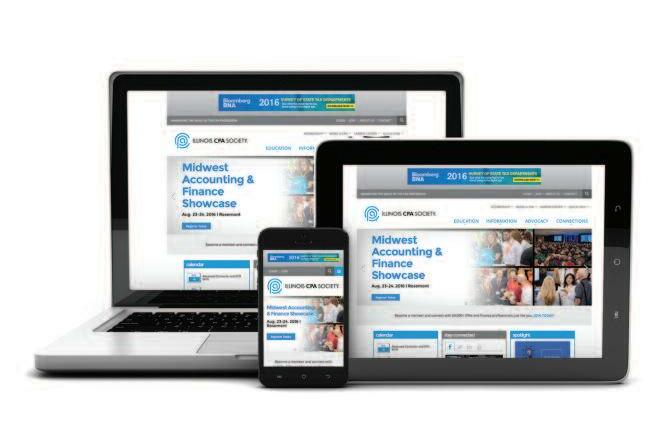
www icpas org/insight | SUMMER 2016 41
We’ve Remodeled!
and take the grand tour!
New Look Streamlined Navigation Responsive Design
Come
Fresh
New Features:
do you think? Contact Michele Haryasz at haryaszm@icpas.org or at 312.517.7640 to share your feedback.
What
Cyber Defense Systems Are Go
IF YOU THOUGHT TECHNOLOGY WAS GOING TO ADVANCE WITHOUT RISK, YOU WERE WRONG. AS WE GROW OUR DEPENDENCE ON COMPUTER-BASED SYSTEMS AND SOLUTIONS, WE ALSO GROW THE THREAT OF DATA AND SECURITY BREACHES
Any organization or individual connected to the Internet is at risk of a cyberattack And while it may be impossible to completely prevent hacker and fraudster mayhem, a solid, carefully considered cybersecurity and cyber-risk management plan can help head off the dangers
Consider the case of the KeySweeper, a nond e s c r i p t , c h e a p - t o - m a k e d e v i c e t h a t h a s b i g breach power Resembling a functional USB or wall charger, most people wouldn’t think twice a b o u t s e e i n g o n e p l u g g e d i n t o a c o n f e r e n c e room outlet or near company servers. But in reality, this hardware is capable of wirelessly harvesting keystrokes from wireless keyboards located in its proximity Potentially that means your personally identifiable information, intellectual property, trade secrets, passwords, and more could be harvested
With that in mind, here are five steps I recommend to help bolster your cyber defenses.
1. Identify critical data
T h e l e v e l o f s e c u r i t y n e e d e d g r o w s i n d i r e c t proportion to the level of your data’s sensitivity
F r o m c o n f i d e n t i a l c l i e n t f i l e s t o i n t e l l e c t u a l property and patents pending, data is king and therefore there’s a market for stealing it.
2. Plan what to protect
A s u c c e s s f u l c y b e r s e c u r i t y d e f e n s e p l a n w i l l protect all data stored or transferred between c o m p u t e r s y s t e m s , n e t w o r k s a n d p r o g r a m s . Individuals and organizations, however, face v a r y i n g d e g r e e s o f r i s k d e p e n d i n g o n t h e i r i n d u s t r y a n d o p e r a t i o n s , a n d t h e r e g u l a t o r y standards they are required to meet Regardless o f t h e p a r a m e t e r s , m a n a g i n g o r r e s t r i c t i n g
access to specific information, data or systems is your first line of defense
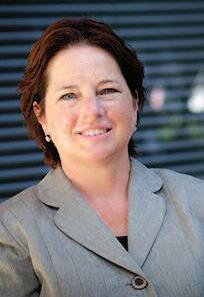
3. Detect your threats
Being familiar with some of the known risks to your data security and the methods by which fraudsters/hackers typically gain access to it is key Much as today’s technology is ever evolving, so too are the methods by which criminals attack Continuously monitoring your networks and environment will help you detect threats before they have the chance to wreak havoc. It w i l l a l s o h e l p y o u k e e p u p o n t h e l a t e s t s c h e m e s b e i n g p e r p e t r a t e d F o r e x a m p l e , emailed malicious code or malware in the form of links or attachments are popular right now Once a user opens the attachment or clicks on the link, access could be granted to that computer or even your entire network.
4. Plan to act
While proactively asking how to avoid being a victim is important, asking how to respond if you do become one is just as crucial At the very least, you should have a set of best practices for responding to known common attacks on the types of information and data you regularly access These practices should be fully developed, tested and documented to ensure a rapid response rate Which brings us to the final tip
5. Be ready to recover
Lessons can and should be learned from any attack. The aftermath will highlight your shortcomings and give you the opportunity to bolster defense plans and update strategies Learn f r o m y o u r m i s t a k e s a n d y o u h a v e t h a t m u c h better of a chance of thwarting future attacks
42 INSIGHT www icpas org/insight
INSIDE FRAUD NEWS, TIPS &
WORLD
FORENSIC ACCOUNTING
TRENDS FROM THE
OF FRAUD &
If you’re not watching your cybersecurity, you’re pretty much welcoming a cyber attack.
Theresa Mack
CPA, CFF, CAMS, PI Cendrowski Corporate Advisors Licensed Professional Investigator, Anti-Money Laundering Specialist and former FBI Special Agent
Board of Directors
CHAIRPERSON
Scott D Stef fens
Grant Thornton LLP
VICE CHAIRPERSON
Lisa A Har tkopf
Ernst & Young LLP
SECRETARY
Rosaria Cammarata
Mattersight Corporation
TREASURER
Margaret M. Hunn
Rozovics Group LLP
IMMEDIATE PAST CHAIRPERSON
Edward J Hannon
Quar es & Brady LLP
DIRECTORS
Brent A . Baccus
Washington Pittman & McKeever, LLC
Christopher F. Beaulieu
Clif tonLarsonA len LLP
Terr y A Bishop Sikich LLP
Jon S Davis
Un versity of Illinois
Eileen M. Felson
Pr cewaterhouseCoopers LLP
Stephen R Ferrara
BDO USA , LLP
Jonathan W Hauser
KPMG LLP
Anne M Kohler
The Mpower Group
Thomas B Mur tagh BKD, LLP
Elizabeth S Pittelkow
ArrowStream, Inc
Kelly Richmond Pope
DePaul Univers ty
Maria de J. Prado
Prado & Renteria CPAs
Andrea K Urban
ThoughtWorks Inc
Kevin V Wydra
Crowe Hor wath LLP
Chapter Presidents
CENTRAL
Amanda L. Gavin
Caterpil ar Inc
CHICAGO METRO
Anna M Harris
CHICAGO SOUTH
Stephen P. Maier
My Accountants Of fice Ltd
FOX RIVER TRAIL
Barrett R. Peterson
TTX Company
FOX VALLEY
Michael N. Radencich
Trimarco Radencich LLC
NORTH SHORE
Bur ton W. Goode
Bur ton W Goode CPA
NORTHERN
Jakob J. Thompson Benning Group LLC
O’HARE
Deborah L. Kur tzke
Grieco Kur tzke & Adelman LLC
WESTERN
John T Kustes American Bank & Trust Company, NA
Committee Chairs
ACCOUNTING PRINCIPLES
Ryan Brady Grant Thornton LLP
AUDIT & ASSURANCE SERVICES

James R Javorcic
CBIZ / Mayer Hof fman
McCann PC
EMPLOYEE BENEFITS
Kathleen A Musial BIK & Company LLP
ETHICS
Gar y E Kemnitz
Borhar t Spellmeyer & Co
GOVERNMENTAL EXECUTIVE
Christine A Torres Crowe Hor wath LLP
GOVERNMENTAL REPORT REVIEW
Stephanie I Blanco
John Kasperek Co Inc CPAs
ILLINOIS CPAS FOR POLITICAL ACTION
Floyd D. Perkins
Nixon Peabody
NOMINATING
Edward J. Hannon
Quarles & Brady LLP
NOT-FOR -PROFIT ORGANIZATIONS
Melissa E. Struck
Clif tonLarsonAllen LLP
The Illinois CPA Society thanks its volunteer leaders for their tireless service and contributions. Volunteers like you are the foundation of the Society, and without you, we would not be able to achieve our core mission of enhancing the value of the CPA profession.
PEER REVIEW REPORT
ACCEPTANCE
Rober t J Giblichman Warady & Dav s LLP
SCHOL ARSHIP SELECTION
Kenton J Klaus Deloitte Tax LLP
TAXATION BUSINESS
Ryan J Vaughan Ernst & Young LLP
TAXATION ESTATE, GIFT AND TRUSTS
Paige B Goepfer t RSM US LLP
TAXATION EXECUTIVE
Jef fer y A Rozovics Rozovics Group, LLP
TAXATION FLOW-THROUGH ENTITIES
Andrew D. Klemens BKD, LLP
TAXATION INDIVIDUAL
Kathleen J Howe-Hrach BMO Harris Bank NA
TAXATION INTERNATIONAL
Madhuri Thaker
P ante Moran, PLLC
TAXATION PRACTICE & PROCEDURES
Mark Heroux Baker Tilly Virchow Krause, LLP
TAXATION STATE & LOCAL
David J Kupiec Kupiec & Mar tin, LLC
WOMEN’S CONNECTIONS
Mar y E. McCormick
Resources Global Professionals
WOMEN’S EXECUTIVE
Eileen M Iles
Crowe Hor wath LLP
Conference Planning
Task Force Chairs
ACCOUNTING & AUDITING
Jodi Seelye Mueller & Company LLP
ADVANCED TOPICS IN FLOW-THROUGH TAXATION
Jef frey D Butler
Kessler, Or ean, Silver & Co, PC
CONSTRUCTION INDUSTRY
Joseph Morad Mi ler Cooper & Company Ltd
EMPLOYEE BENEFITS SPRING
JoAnn E Cassell
Cassell Plan Audits, Inc
EMPLOYEE BENEFITS WINTER
Caroline L. Vanalek
Crowe Hor wath LLP
ESTATE & GIFT TAX
Fred H. Jahns
Brookwood Vance LLC
FINANCIAL INSTITUTIONS
Brian J. Blaha
Wipfli LLP
FRAUD & FORENSIC
Frank L. Der y PricewaterhouseCoopers LLP
GOVERNMENT
Linda S. Abernethy
RSM US LLP
HEALTHCARE COMPLIANCE & FRAUD
Howard L Stone Stone, McGu re & Siegel, PC
IRS/TAX PRACTITIONERS
SYMPOSIUM
Michael J Singer
Michael J Singer & Co , PC
MANUFACTURING
Rober t G Lindeman
Over ture Group LLC
MIDWEST FINANCIAL REPORTING
SYMPOSIUM
David L Landsittel
David L Landsittel, CPA
NOT-FOR -PROFIT ROSEMONT
Rebekuh A Eley
BDO USA , LLP
NOT-FOR -PROFIT SPRINGFIELD
Kim R Michael-Lee
NOT-FOR -PROFIT COMPLEX AND EMERGING ACCOUNTING AND A-133 ISSUES
Charlotte A Montgomer y STATE & LOCAL TAX
David C Blum Akerman LLP
TAXATION ON REAL ESTATE
Douglas Har t DAD Associates LLC
WOMEN’S LEADERSHIP FORUM
Lindy R Ellis
Ernst & Young LLP
Member Forum Group Chairs
FUTURES, SECURITIES & DERIVATIVES
Adam J. Wilhite RSM US LLP
PERSONAL FINANCIAL PL ANNING
Elizabeth D Buf fardi
Crescendo Financial Planners
Brian J Kearns
Morgan Stanley Wealth
Management
NOT-FOR -PROFIT
Alison H. Fetzer ORBA
Task Force Chairs
COMMITTEE STRUCTURE & VOLUNTEERISM
Rona Bezman
Rona Bezman, CPA
CPA EXAM AWARD
Deborah K. Rood
CNA Insurance
LEGISL ATOR TAX GUIDE
Victor V Scimeca
Victor V Scimeca, CPA
LESTER H MCKEEVER JR
ADVANDING DIVERSIT Y AWARD
Pedro A Diaz de Leon InnerWorkings Inc
LIFETIME ACHIEVEMENT AWARD
Edward J Hannon Quarles & Brady LLP
OUTSTANDING EDUCATOR AWARD
Jason Parish
Plante Moran, PLLC
YOUNG PROFESSIONALS
LEADERSHIP AWARD
Michael J. Maf fei GATX Corporation
Other Volunteer Group Chairs
DIVERSIT Y ADVISORY COUNCIL
Seun Salami
Jones Lang LaSalle Inc
TAX ADVISORY GROUP
Eunice K. Sullivan
S & P Tax Solut ons, Ltd
YOUNG LEADERS
ADVISORY COUNCIL
Megan P Angle
Por te Brown LLC
YOUNG PROFESSIONALS GROUP
Timothy F Bellazzini
Sikich LLP
Kate Ernst CohnReznick
April 1, 2016 through March 31, 2017
A Dash of Big Data
Soupe du jour or recipe for change?
BIG DATA THIS AND BIG DATA THAT; YOU CAN'T OPEN A SINGLE BUSINESS JOURNAL TODAY WITHOUT SEEING BIG DATA COVERED IN SOME WAY WHILE BIG DATA IS A POPULAR CONCEPT, IT’S MORE THAN JUST A FAD; IT’S CHANGING THE WAY BUSINESSES OPERATE ACROSS THE BOARD
Big Data encompasses amazing new technologies that have made data storage, maintenance a n d a n a l y s i s s i g n i f i c a n t l y m o r e e c o n o m i c a l , efficient and downright productive We’re all f a m i l i a r w i t h m e g a b y t e s , b u t w h a t a b o u t t h e zettabyte? A zettabyte is sextillion bytes (aka a lot of data), and today’s technologies are allowing us to mine this information faster than ever before. Faster access to significantly more data means more advances in analytical technique, a c c e s s t o d e e p e r d a t a - d r i v e n i n s i g h t s , a n d access to ongoing real-time data analysis
For corporate finance professionals, that translates into the need to become more tech savvy ASAP. The availability of more data and the advanced tools and techniques used to analyze it are presenting us with a unique opportunity to hone new skills and specialties that allow us to provide valuable data-driven insights and make better business decisions As finance professionals, we’re uniquely qualified to transform data into meaningful subject matter; however, if you didn’t minor in data science, terms like "k-means clustering" and "bag of words modeling" may leave you lost in translation
So where do you go to develop your data literacy? I recommend starting here:
n Big Data Beyond the Hype: A Guide to Conversations for Today ’ s Data Center
Authored by Paul Zikopoulos, et al, Zikopoulos leads IBM’s Big Data and analytics efforts, and I was fortunate to see him present at the AICPA's
Spring Council meeting earlier this year He has an easy, conversational style that makes technical concepts very accessible The aim of his book is to help you hold your own in a conversation about Big Data. It’s available in various formats, but here’s a hint: If you Google the title, you can find free digital copies from IBM and other providers
n The Signal and the Noise: Why So Many Predictions Fail But Some Don't
If you haven’t taken a statistics course recently, this book, authored by Nate Silver, is a good refresher on what predictive science can and can't do It’s also a reminder that correlation is not causality and extra decimal points don’t necessarily make a model more precise Silver is famous for his near perfect predictions of the 2008 and 2012 presidential election outcomes, and in this book he shows us the importance of understanding how our cognitive biases may lead us to misapply data in decision-making
n D a t a S m a r t : U s i n g D a t a S c i e n c e t o
Transform Information into Insight
We CPAs love Excel, right? Well this book, authored by John W Foreman, will show you how to design data models in Microsoft Excel, apply various data science techniques to both structured and unstructured data and draw insights from these models and techniques to benefit your business, large or small Once you've learned how to apply a naive Bayes

44 INSIGHT www icpas org/insight
CORPORATE MINDS TOP ISSUES CONFRONTING
FINANCE LEADERS & THE CORPORATE WORLD
Rose Cammarata
CPA, CGMA VP & Controller, Mattersight ICPAS Board of Directors
model to unstructured language data, pivot tables and VLOOKUPs will seem utterly passé

n Curated TED Talks Series, Making Sense of Too Much Data
This is another great resource. If you aren’t familiar with TED Talks [www.ted.com], you’re missing out. Wondering what to do with all of the information your company collects? Not sure what data is ethi c a l t o c o l l e c t o r s h a r e ? N e e d t o u n d e r s t a n d w h a t o u r i n f i n i t e a m o u n t s o f d a t a c a n d o ? T h i s c o l l e c t i o n o f t a l k s t a k e s o n t h e s e fascinating questions and offers some great real-life applications of Big Data.
n Big Data Education
If you’re up for it, there are plenty of educational resources out there for you to dive into headfirst. For instance, there are MOOCs (massive open online courses) available about Big Data and data science through Coursera.org. These courses generally take place over several weeks and include a variety of assignments and opportunities to participate in discussion forums. Best of all, many of Coursera’s courses are free if you don’t need certification. Johns Hopkins University offers an Executive Data Science series of five courses through Coursera. If you don't have time for the whole series, I recommend the first course, “A Crash Course in Data Science.” Additionally, the University of Pennsylvania offers a Business Analytics course series that provides instruction on building models for various types of data.
Big Data is hot, and shows no signs of cooling. I suggest you get your first taste if you haven’t done so already.

www icpas org/insight | SUMMER 2016 45
SELL AN ILLINOIS
gross revenues shown NW Illinois CPA Practice $380K; Wheaton CPA Practice $732K; Naperville/Plainfield Area CPA Practice $80K; NW Chicago/Albany Park Area EA

Practice $300K
For practice details call 1-800-397-0249
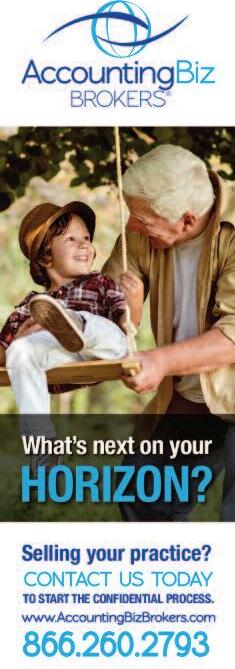
Or, visit us at www AccountingPracticeSales com to inquire about available opportunities and register for free email updates
THINKING OF SELLING YOUR
Accounting Practice Sales is the leading marketer of accounting and tax practices in North America We have a large pool of buyers, both individuals and firms, looking for practices now We also have the experience to help you find the right fit for your firm, negotiate the best price and terms and get the deal done
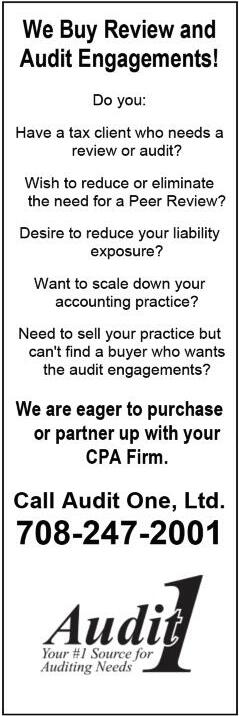
VALUATION OF YOUR CLIENT’S BUSINESS OR PRACTICE
By: Crandall & Brackett, Ltd. 630 653 7922 Email: robert@crandall-brackett.com Web: www crandall-brackett com

Our only service is performed on your behalf in a mutual engagement setting From basic research to a full valuation, we tailor our services to your needs We author, teach and participate on policy setting committees and boards within the valuation profession
MEDIATION AND DISPUTE RESOLUTION SERVICES BUSINESS & PARTNERESHIP FINANCE & ACCOUNTING INTERNAL AND EXTERNAL CORPORATE DISPUTES EMPLOYMENT DISCRIMINATION HEALTHCARE
COMMUNITY FAMILY
46 INSIGHT www icpas org/insight CLASSIFIEDS www.accountingbroker.com Call for a Free Report 800.419.1223 Maximize Value When You Sell Your Illinois FirmTM 100% of Our Brokers are Ex Big-4 CPA's
PRACTICES
SALE
BUY OR
ACCOUNTING OR TAX PRACTICE ILLINOIS
FOR
PRACTICE?
CADWALLADER CORPORATION
To learn about our risk-free and confidential services, call Trent Holmes at 1-800-397-0249 or email trent@accountingpracticesales com SERVING THE CHICAGO AREA FOR OVER 30 YEARS
“WHEN WE LISTEN, PEOPLE TALK” ®
312-664-8375
Michael cadcorp@sbcglobal net
2016 | Illinois CPA Society | Conferences
















































August 23-24 | Rosemont
Midwest Accounting & Finance Showcase
September 20 | Des Plaines
Midwest Financial Reporting Symposium
September 27 | Oak Brook
Financial Institutions
October 20 | Chicago
Fraud & Forensic
October 25 | Oak Brook
Construction
October 26 | Chicago
Manufacturing
November 3 | Des Plaines
Healthcare Compliance & Fraud Half-day
November 10 | Des Plaines
IRS Tax Practitioners Symposium

November 17 | Rosemont
Not-for-Profit
November 18 | Chicago
Women's Leadership Forum
November 30 | Rosemont
December 1 | Springfield
Accounting & Auditing
December 2 | Springfield
Not-for-Profit
December 7 | Chicago
Advanced Topics in Flow-Through Taxation Half-day
December 13 | Rosemont
Employee Benefits
January 26, 2017 | Chicago
State & Local Tax
March 23, 2017 | Rosemont
Controllers
Register at www.icpas.org/education.htm
The days of sitting mindlessly in front of the instructor for eight hours are gone.






Maximize the return on your training investment as you put your brain in its happy place with new, engaged learning activities at ICPAS education programs:
Game Shows Group Discussions








Role Playing Case Studies
Online Polling Simulations











































Start enjoying your learning experience with ICPAS Engage courses, conferences, OnDemand and Newscast programs.
video See what makes our courses so much fun.
For more information on ICPAS Engage offerings, visit:
www.icpas.org

www icpas org/insight | SUMMER 2016 47
capitolReport
OUR MAN IN SPRINGFIELD REPORTS ON THE LATEST LEGISLATION
Crisis & Deadlock
The Spring Legislative Session yields little in terms of positives.
Marty Green, Esq. ICPAS VP of Government Relations

Ag ain, the budget deadline came and went with the Illinois General Assembly failing to pass a State Operating Budget State employees and some service providers are being paid with federal funds and through consent decrees and court orders, but many others remain in limbo as they continue to go without payment The State’s list of unpaid vendors and service providers has stretched to record levels, with $6 8B owed, according to the Comptroller
As the May 31 deadline approached, there was some momentum to pass a stopgap budget, but that was soon overshadowed by the enormity of the proposal. With budget working groups c o n t i n u i n g t o m e e t , I e x p e c t t h e H o u s e t o r e m a i n i n s e s s i o n throughout the summer.
Even with the ongoing budget dilemma, however, a number o f b i l l s a d v a n c e d d u r i n g t h e S p r i n g L e g i s l a t i v e S e s s i o n t h a t impact the CPA profession.
House Bill 5527 (Tax Preparer Oversight Act) was an Illinois CPA Society (ICPAS) initiative to implement the Tax Return Preparation Task Force’s recommendation to require all paid tax preparers to use a Federal Preparer Tax Identification Number (PTIN) HB 5527 also authorizes the Illinois Department of Revenue (IDOR) to share preparer information with the IRS and other states, and discipline or bar preparers We worked closely with the AICPA to ensure that this legislation complimented pending Federal regulations HB 5527 passed both Chambers and awaits the Governor
Senate Bill 2434 (Firm Mobility) was an Illinois Department of Financial and Professional Regulation (IDFPR) initiative supported by ICPAS to grant licensed out-of-state CPA firms the same privileges as firms licensed in Illinois under the Illinois Public Accounting Act. SB 2434 also extends individual CPA mobility to CPA firms that perform attest services, allowing their CPAs to move seamlessly between states SB 2434 unanimously passed the Senate but requires a substantive committee hearing in the House We’re working on advancing this measure
House Bill 5973 (Ban the Box-2) would have significantly reduced the IDFPR’s discretion to deny professional licenses to CPAs based on a felony conviction. We worked with bill sponsor Rep. Marcus Evans to amend the bill and remove CPAs from the list of enumerated professions because of the CPA’s public and fiduciary duty The sponsor ’s intent is to remove reentry barriers to rehabilitated prisoners
Senate Bill 2270 (Local Government Audits) as introduced would have required local governments, community colleges and universities to rotate audit firms every five years (unless the firm rotates audit partners), competitively bid audit services, and accept the lowest competitive bid After much opposition, SB 2270 was amended to remove the competitive bid requirement and the requirement to accept the lowest bid, but requests for proposals still must be made every five years. SB 2270 passed the Senate and has extended established deadlines in the House We worked with the opposition, legislative staff and the sponsor to ensure their understanding of this bill’s impact on government entities and auditors
Senate Bill 2933 (Contingent Fee Audits) authorized the IDOR to expand the dissemination of taxpayer information to municipalities and stipulated that municipalities could share that information with third parties working on contingent fee arrangements (contingent fee audits) to identify businesses with unpaid taxes We joined other opponents in defeating this legislation
bills, and several hundred have moved to the Governor ’s desk Our real-time Legislative Tracking Report can be found on the ICPAS website under the “Advocacy” menu.
As always, we’ll be monitoring the legislation impacting you and the CPA profession, and looking for your messages about the legislation that concerns you most
48 INSIGHT www icpas org/insight
T h e S p r i n g L e g i s l a t i v e S e s s i o n h a s p r o d u c e d t h o u s a n d s o f
LIFETIME ACHIEVEMENT AWARD
Mary Lou Pier, CPA, CGMA
President, Pier & Associates, Ltd.
OUTSTANDING EDUCATOR AWARDS
Vicky J. Eidson, D. Mgt., CPA, CMA
Associate Professor of Accounting, Director of Corporate and Public Affairs for the School of Business, Quincy University
Marcus D. Odom, PhD, CPA (inactive), CFE
Professor and Deloitte & Touche Faculty Fellow, School of Accountancy, Southern Illinois University Carbondale
Dominique Svarc, CPA
Assistant Professor of Accounting, Harper College
LESTER H. MCKEEVER JR.
OUTSTANDING LEADER IN ADVANCING DIVERSITY AWARD
Edilberto C. Ortiz, CPA, CGMA Partner, E.C. Ortiz & Co., LLP
LESTER H. MCKEEVER JR. EMERGING LEADER IN ADVANCING DIVERSITY AWARD
Juan J. Ortiz, CPA Manager, Deloitte Tax LLP
YOUNG PROFESSIONAL LEADERSHIP AWARD
Elizabeth Sara Pittelkow, CPA, CITP, CGMA
Director of Accounting and Compliance, ArrowStream, Inc.
TIME AND TALENT PUBLIC SERVICE VOLUNTEERISM AWARD
Douglas Hart, CPA
Managing Member, DAD Associates LLC
The Illinois CPA Society is proud to recognize all of our 2016 award winners and congratulate them on their accomplishments.
DISTINGUISHED SERVICE AWARDS
Howard I. Blumstein, CPA
BDO USA, LLP
Not-for-Profit Organizations Committee
Elizabeth D. Buffardi, CPA, CFP(R)
Crescendo Financial Planners, Inc.
Personal Financial Planning Member Forum Group
Timothy C. Custis, CPA
Gorenz and Associates, Ltd.
Governmental Report Review Committee
Jeffrey H. Ellis, CPA
FTI Consulting, Inc.

Accounting Principles Committee
Rebekuh Eley, CPA, MST
BDO USA, LLP
Not-for-Profit Organizations Committee
Eileen M. Felson, CPA, CFF
PricewaterhouseCoopers LLP
Audit & Assurance Services Committee
David M. Henderson, CPA, CFP, JD, LLM
DUGGAN BERTSCH, LLC
Taxation - International Committee
George A Heyman, CPA, CGMA, MAS, MBA
AuditSense
Ethics Committee
Brian Kearns, CPA
Morgan Stanley
Personal Financial Planning Member Forum Group
Anne M. Kohler, CPA, CGMA, MBA
The Mpower Group, Inc.
Women’s Executive Committee
Rick Meyer, CPA, MBA, MST
alliantgroup, LP
Taxation - Business Committee
Andrew K. Strimaitis, Esq.
Barack Ferrazzano Kirschbaum & Nagelberg LLP
Employee Benefits Committee
Mark W. Wolfgram, CPA, MST
Bel Brands USA
Taxation - Business Committee
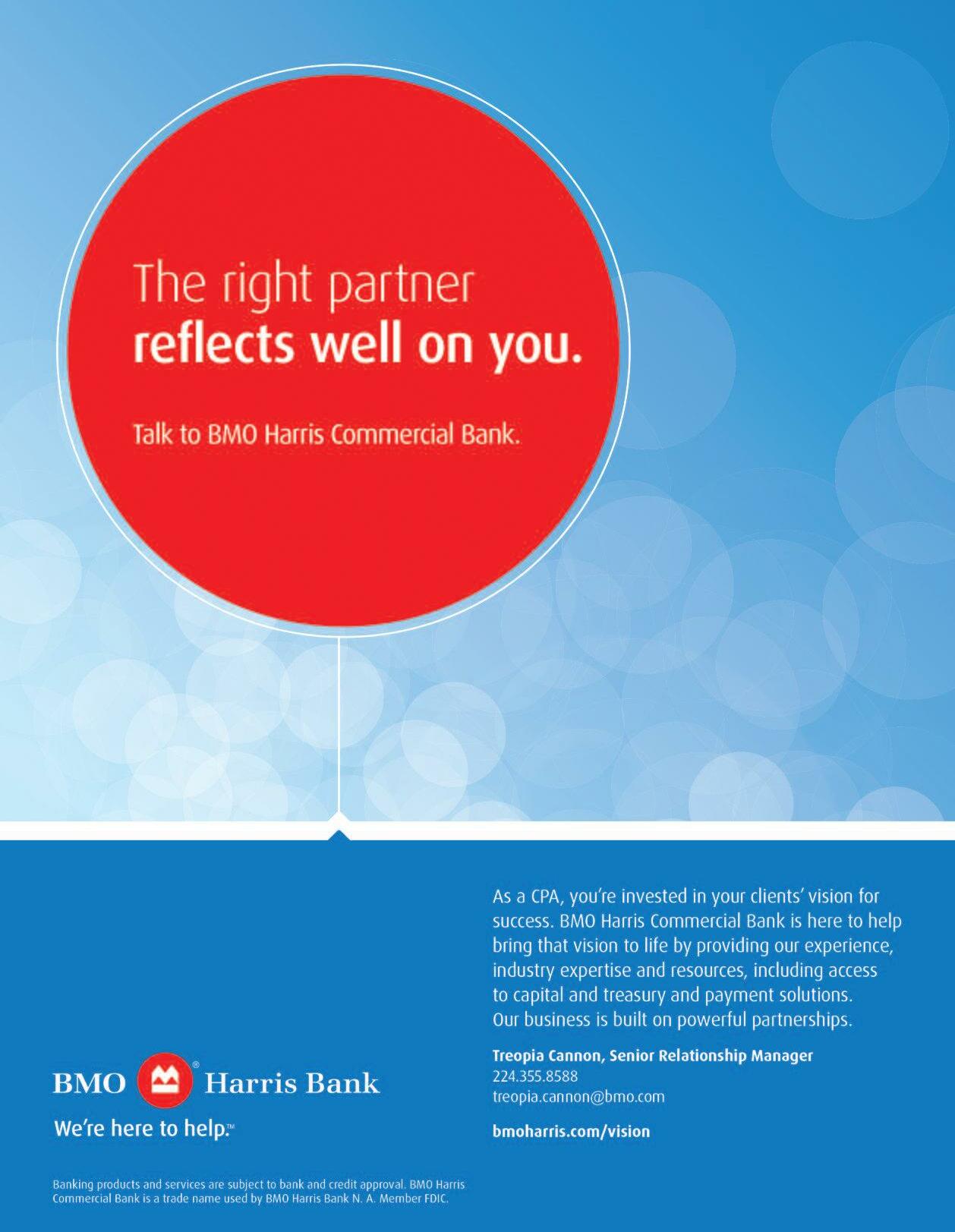

















 INSIGHTS & SOCIETY NEWS FROM TODD SHAPIRO, ICPAS PRESIDENT & CEO today
INSIGHTS & SOCIETY NEWS FROM TODD SHAPIRO, ICPAS PRESIDENT & CEO today





















 By Selena Chavis
By Selena Chavis

 By Derrick Lilly
By Derrick Lilly



 By Brian J. Hunt, J.D.
By Brian J. Hunt, J.D.










 By Kristine Blenkhorn Rodriguez
By Kristine Blenkhorn Rodriguez



















